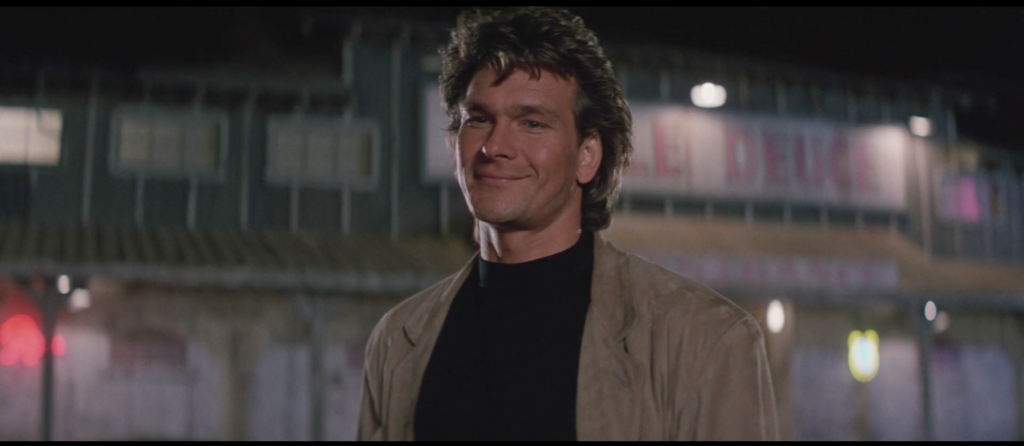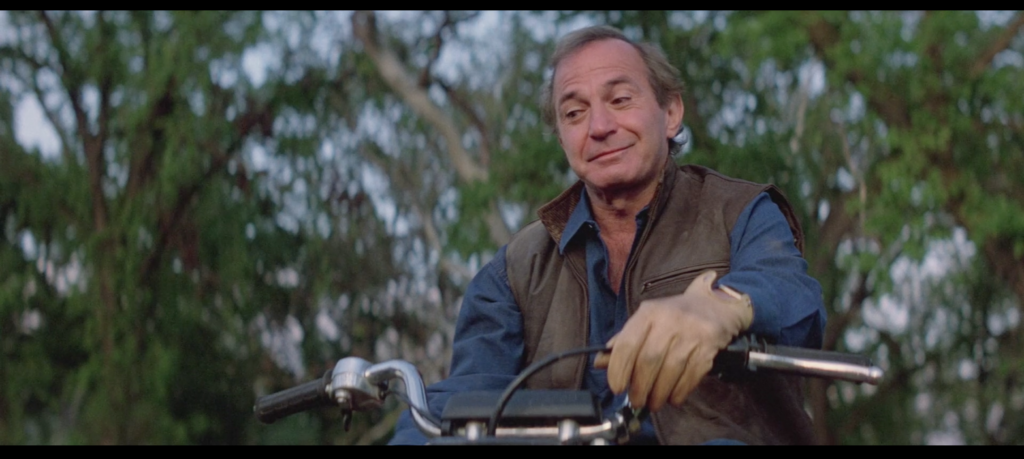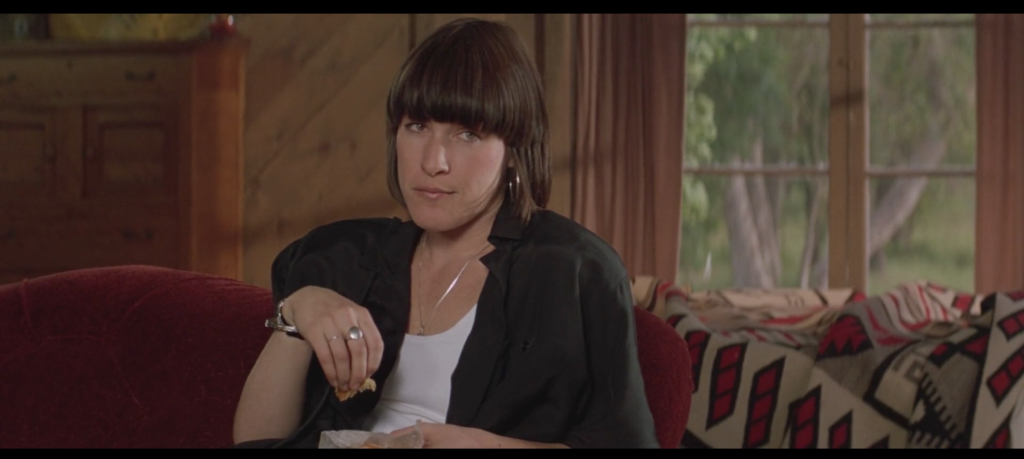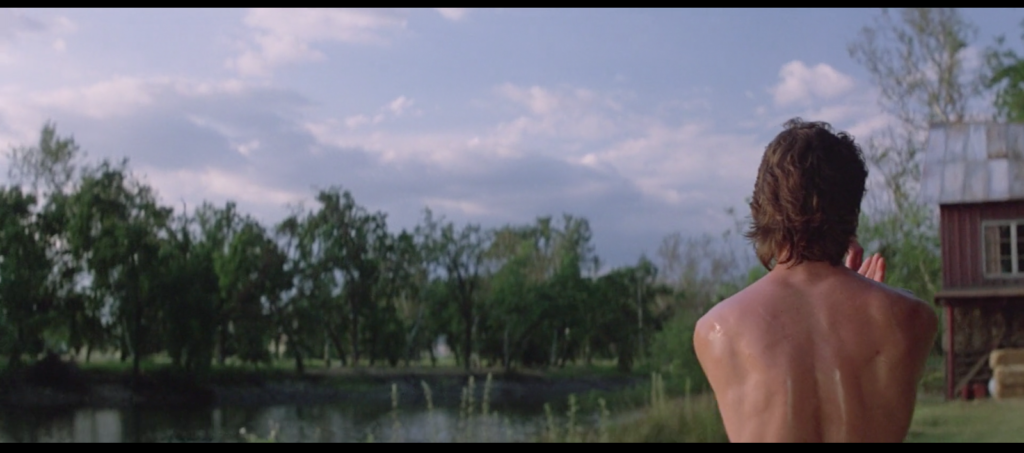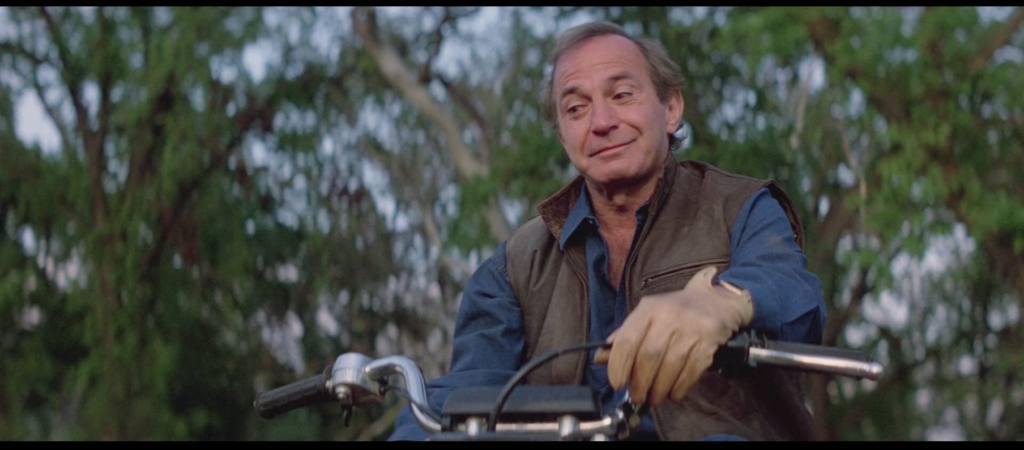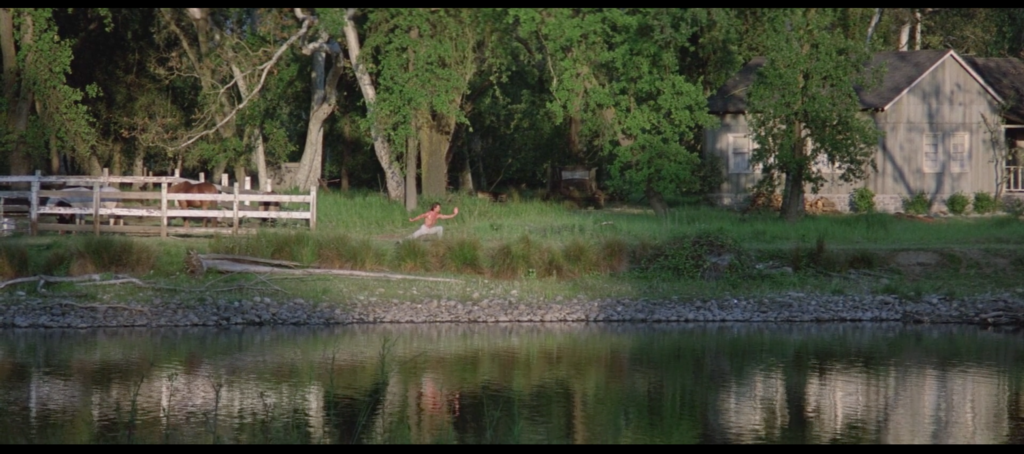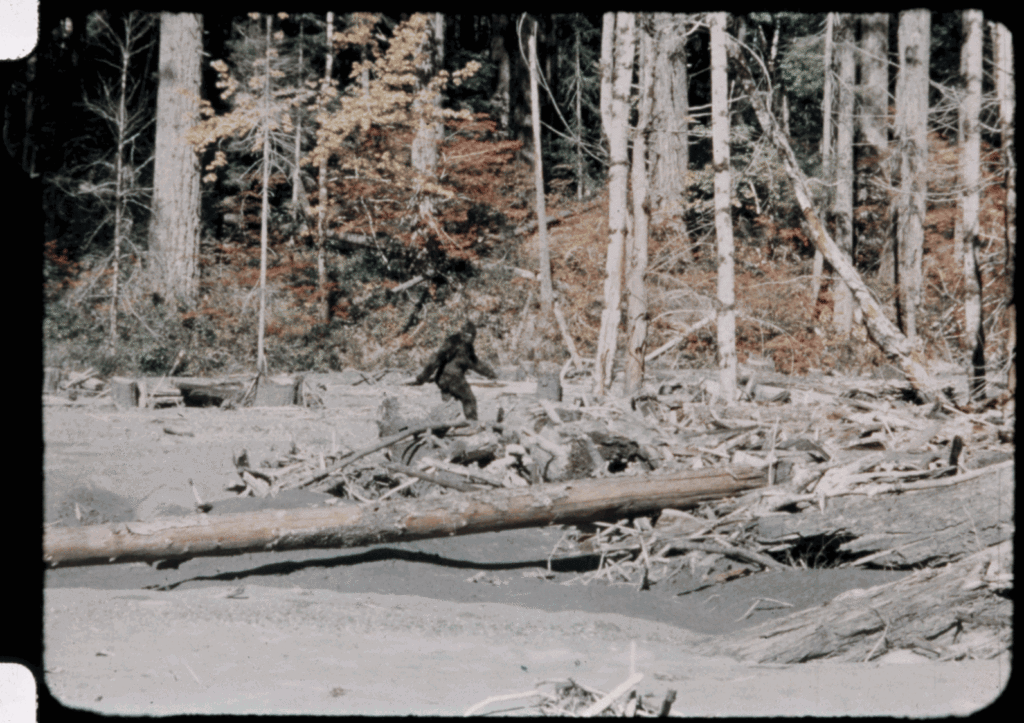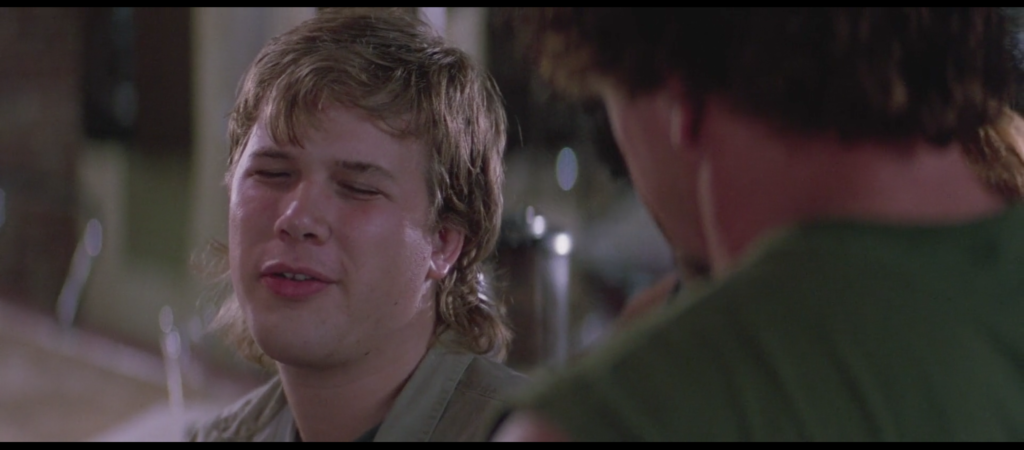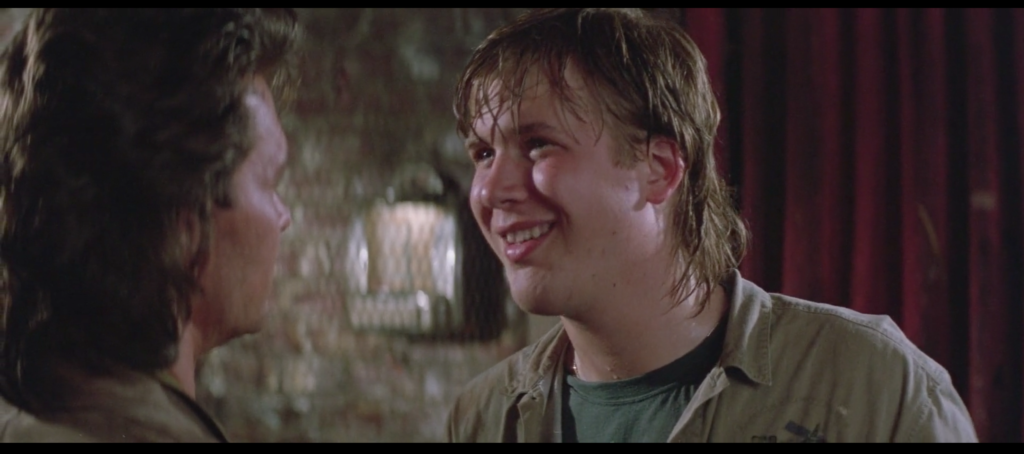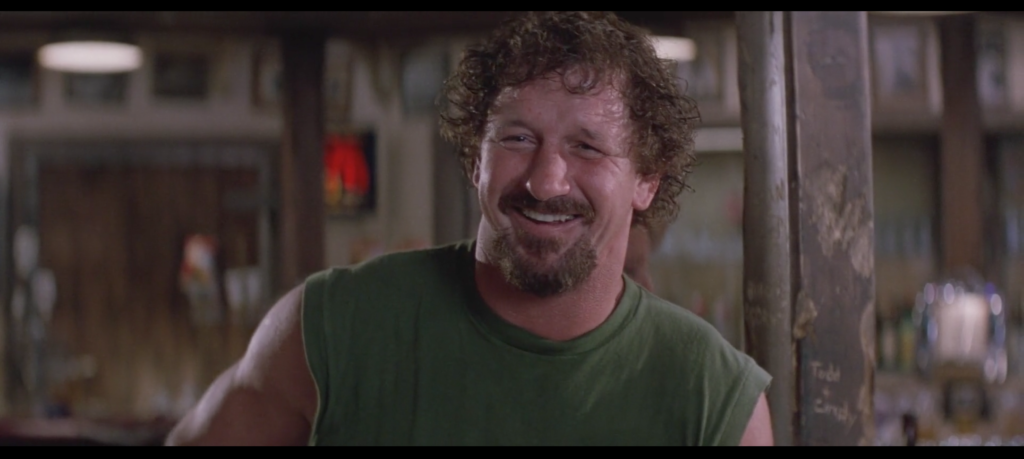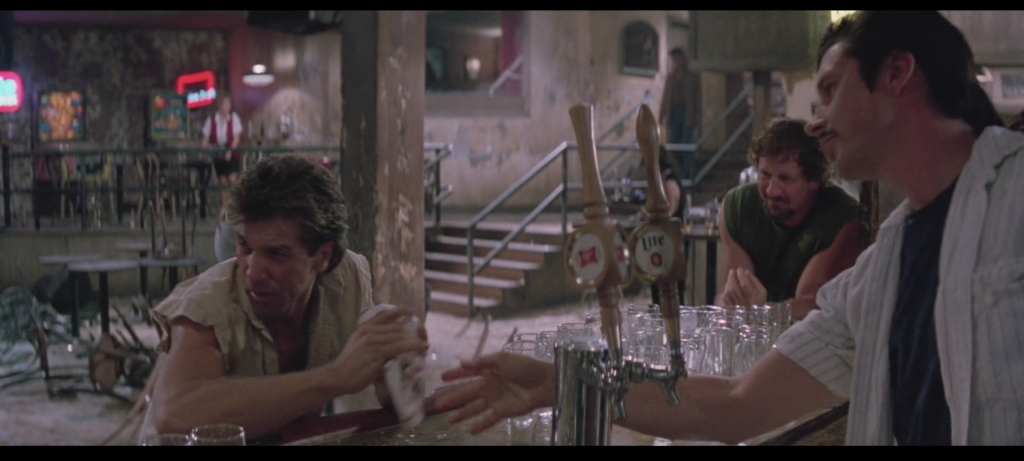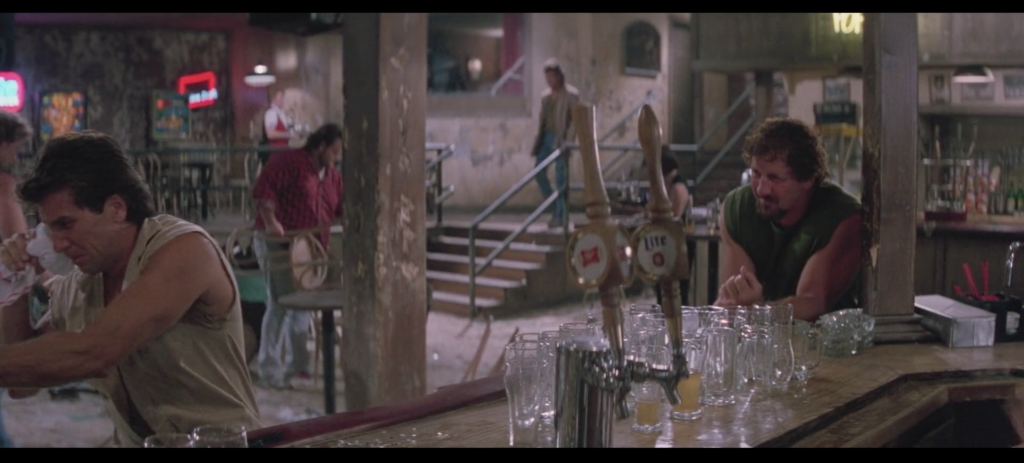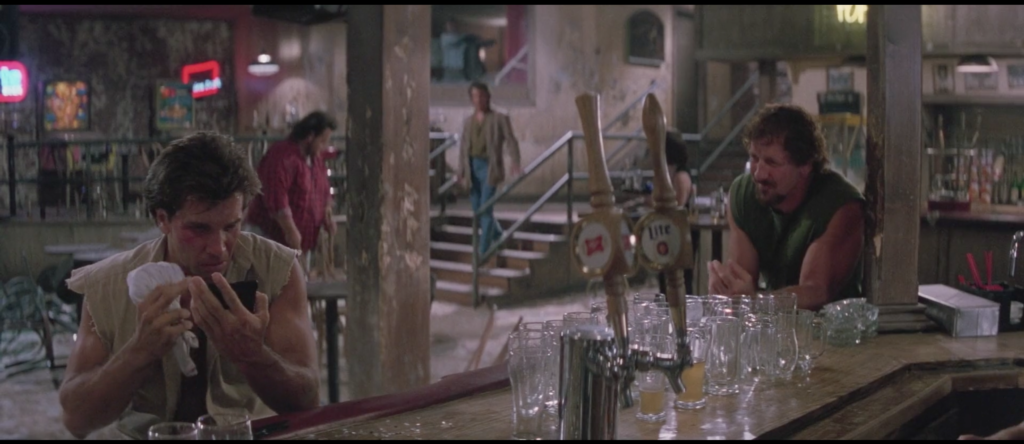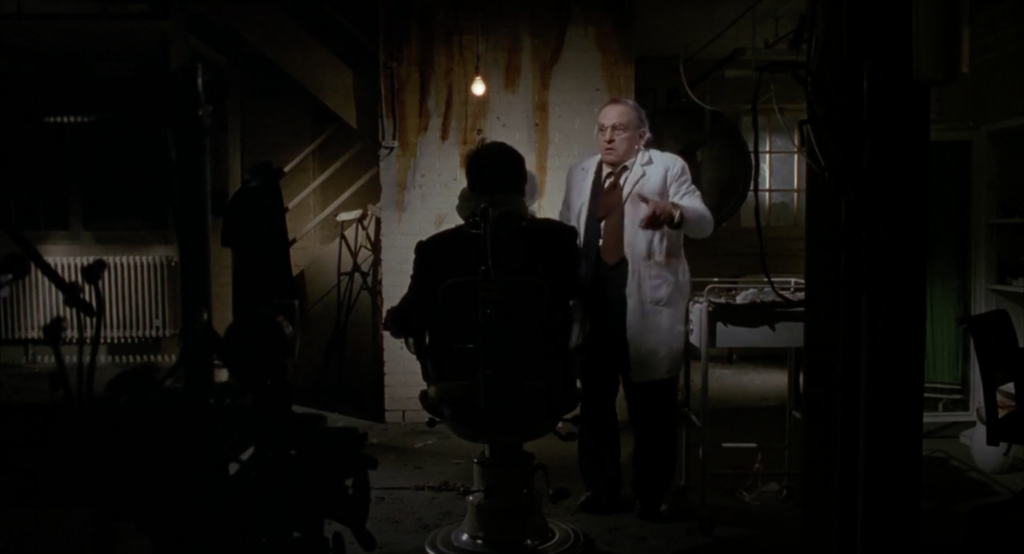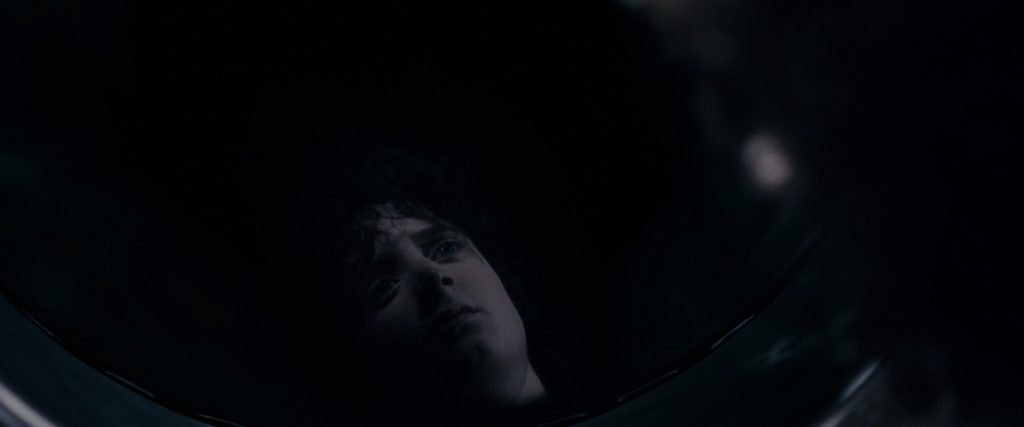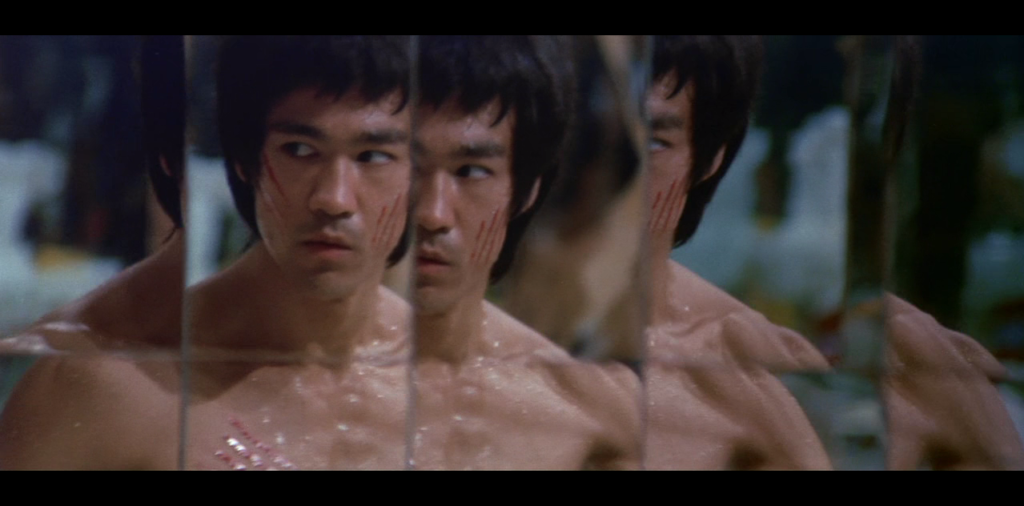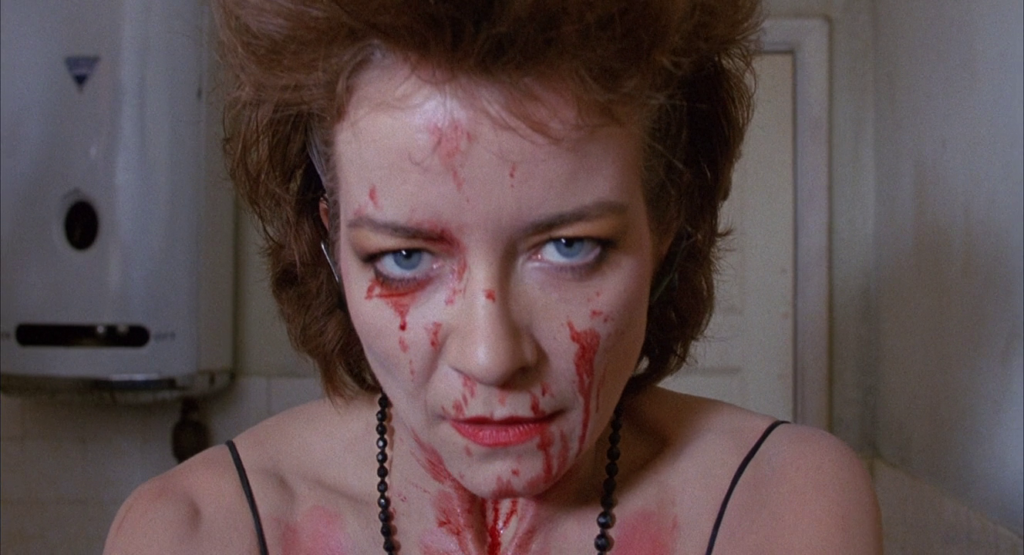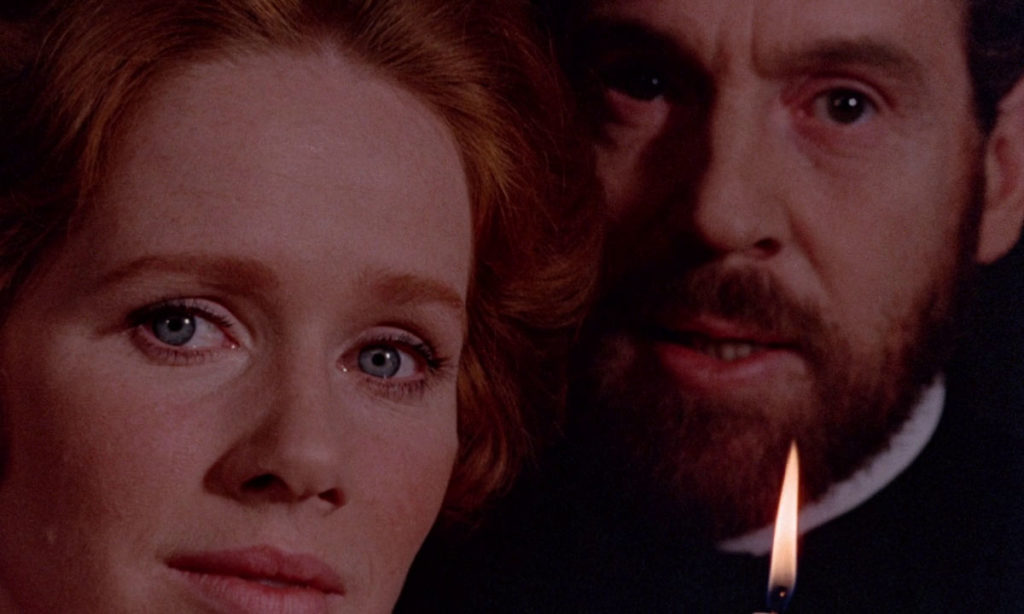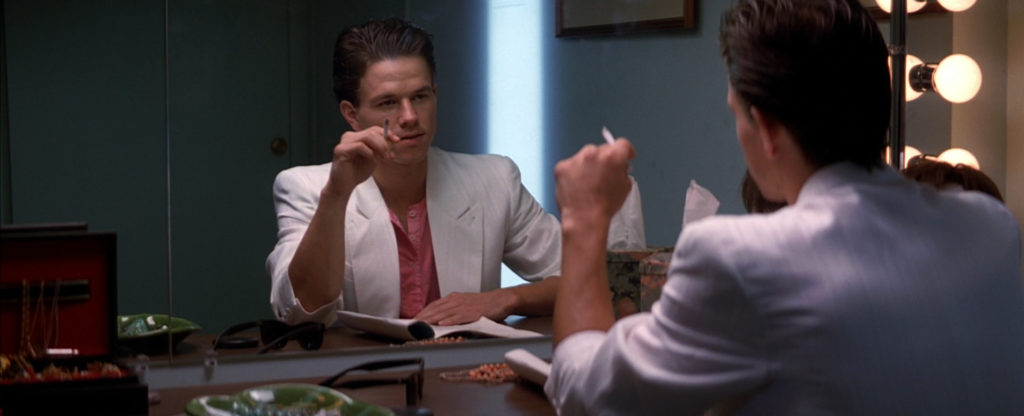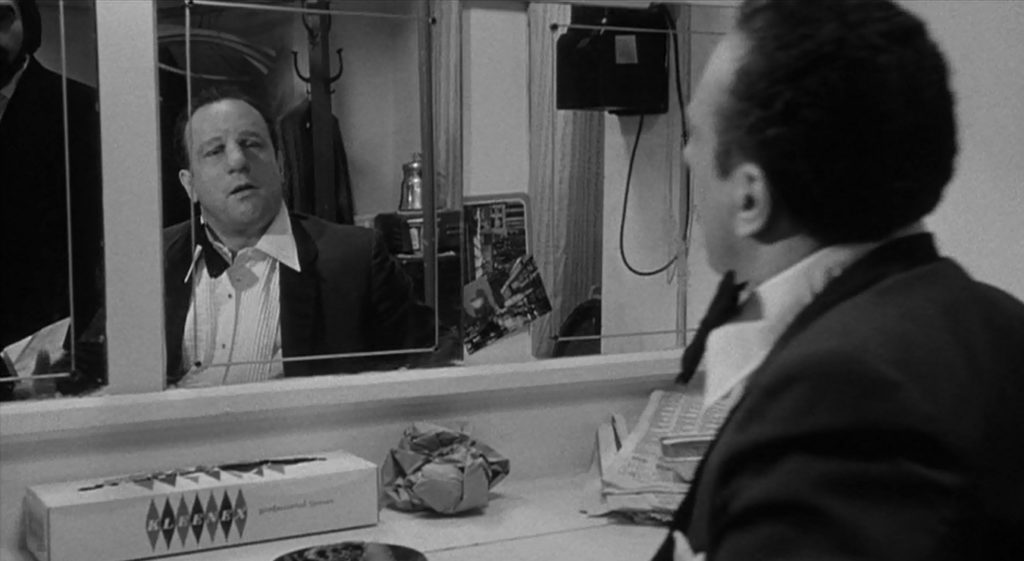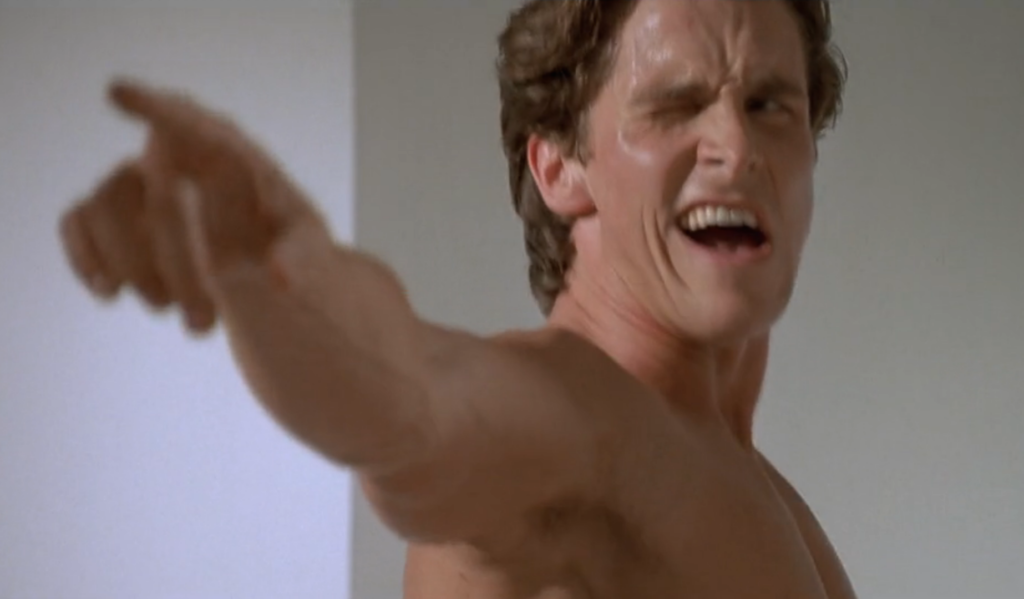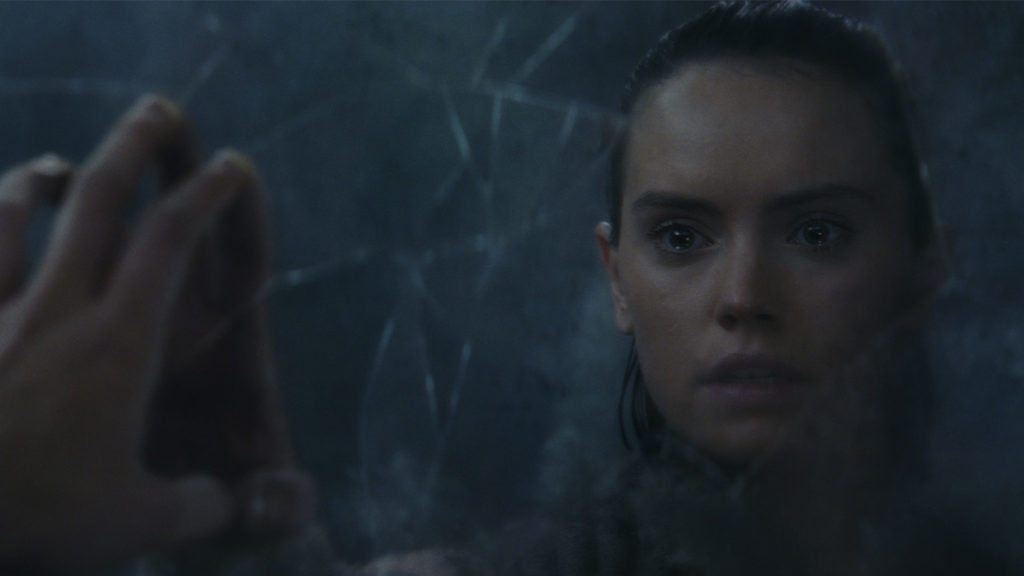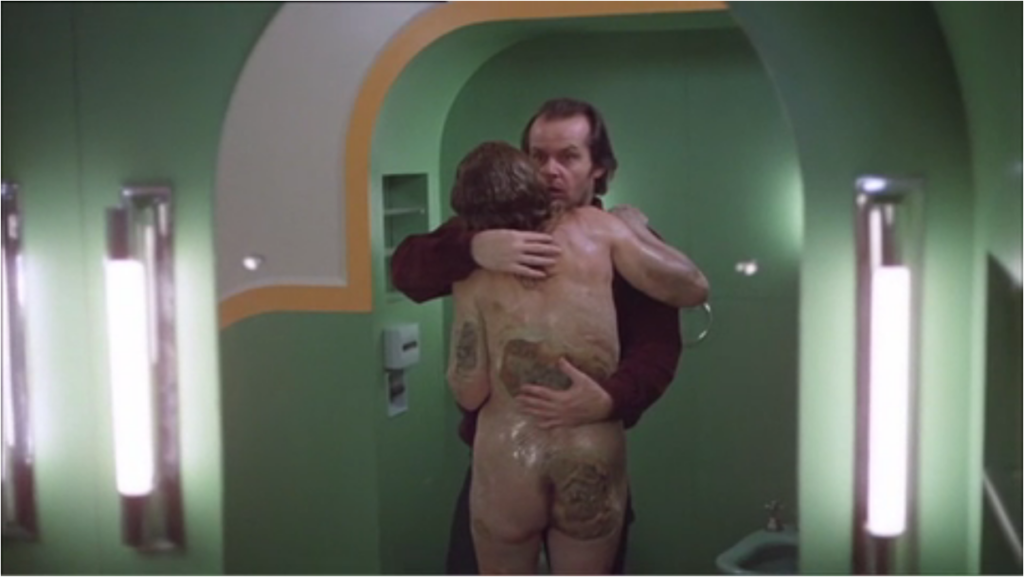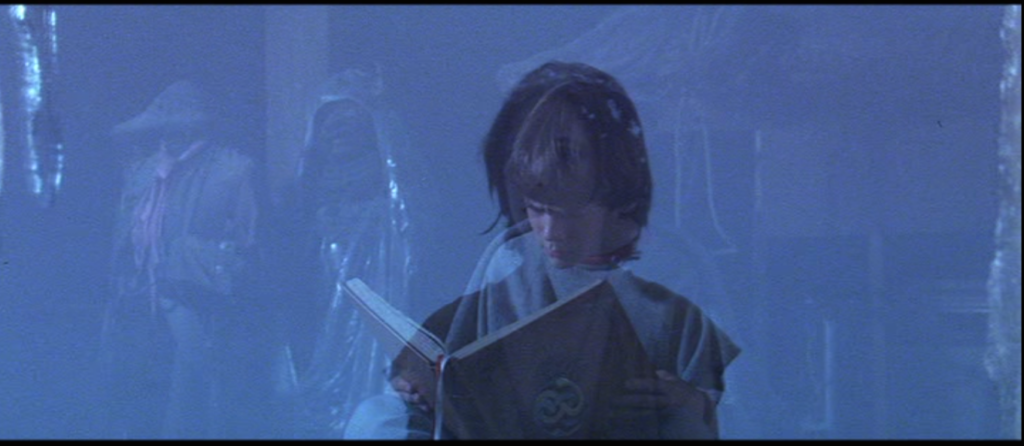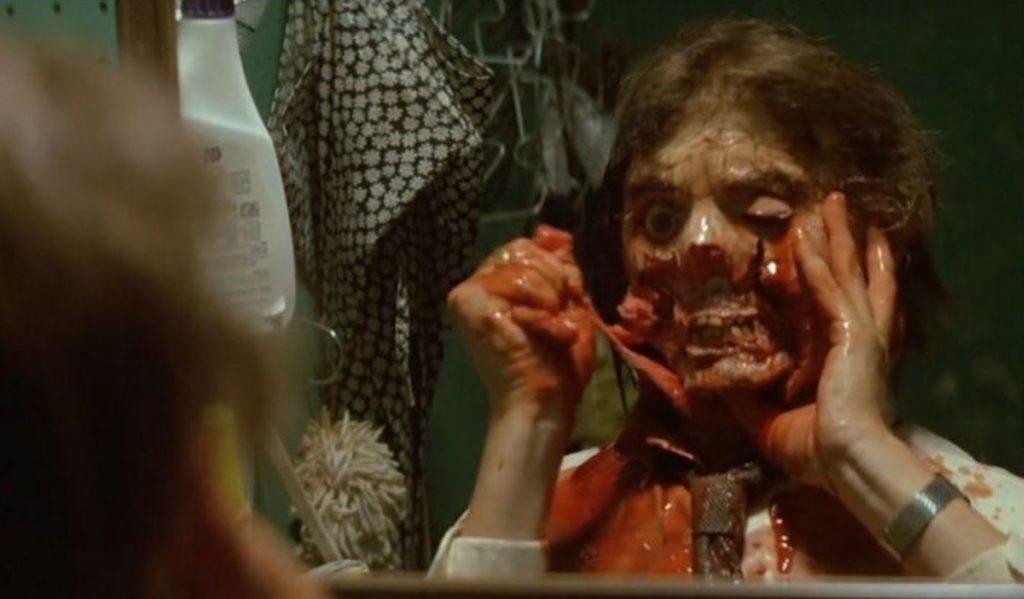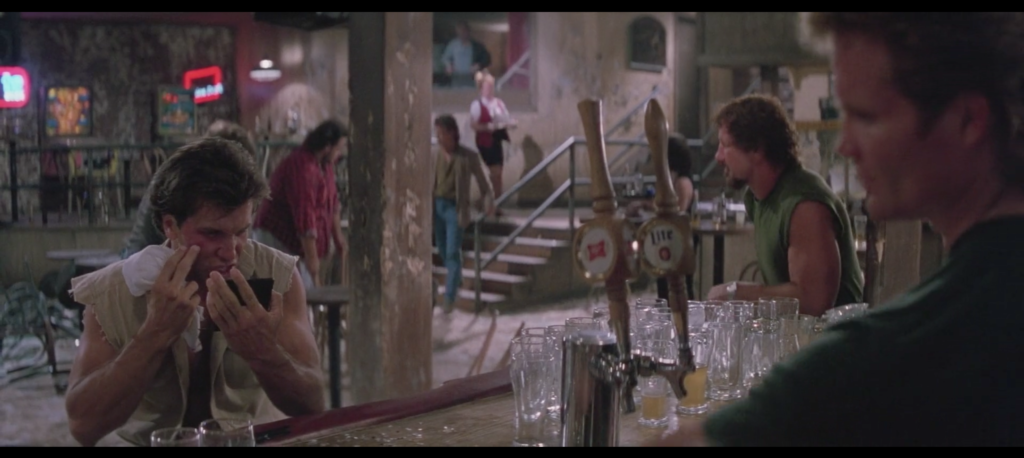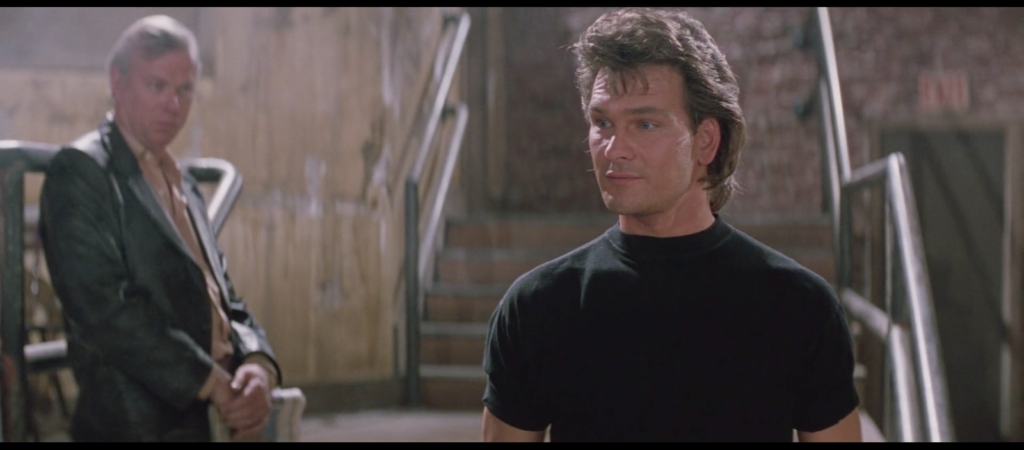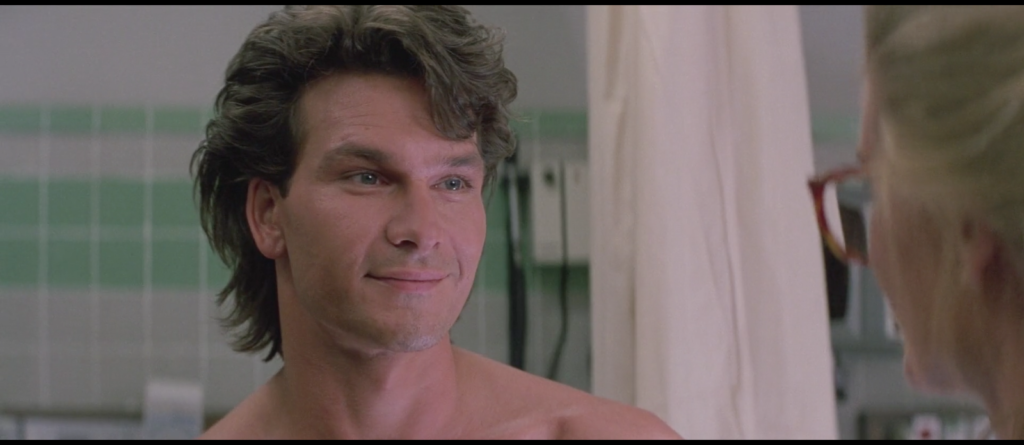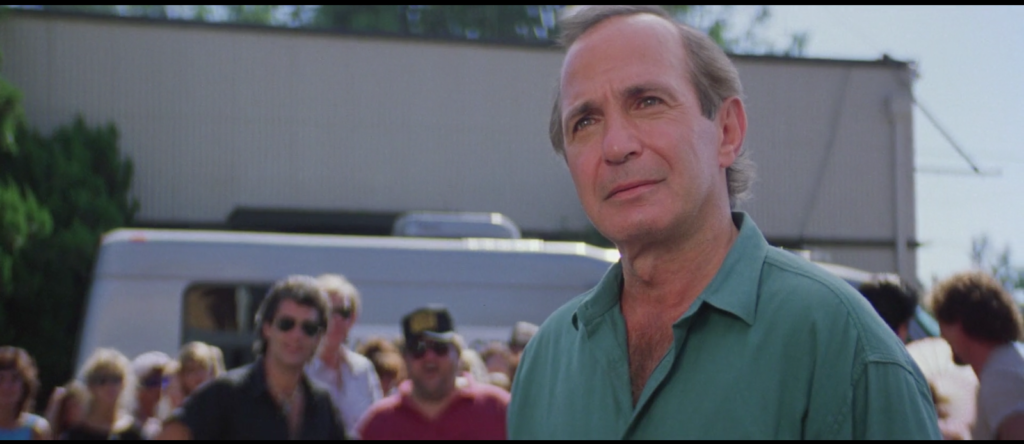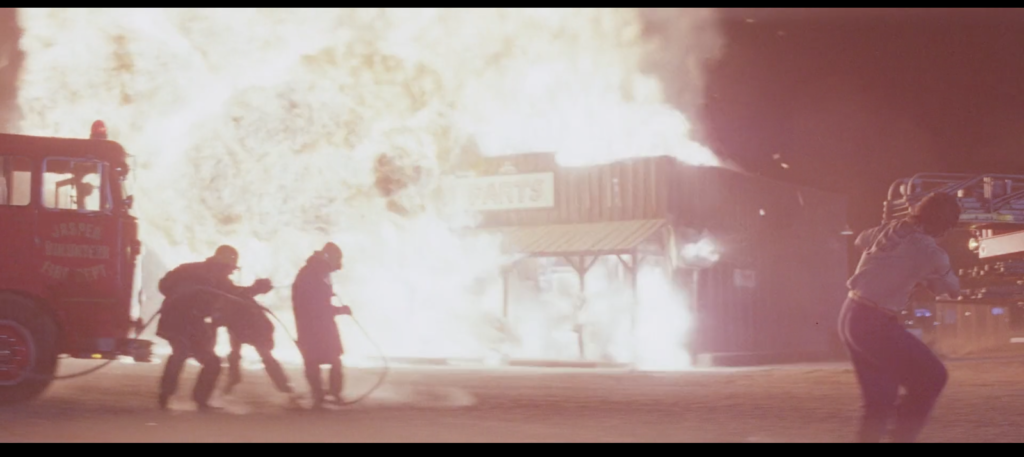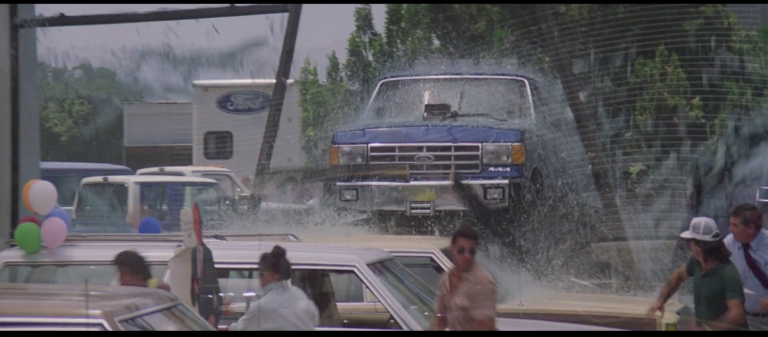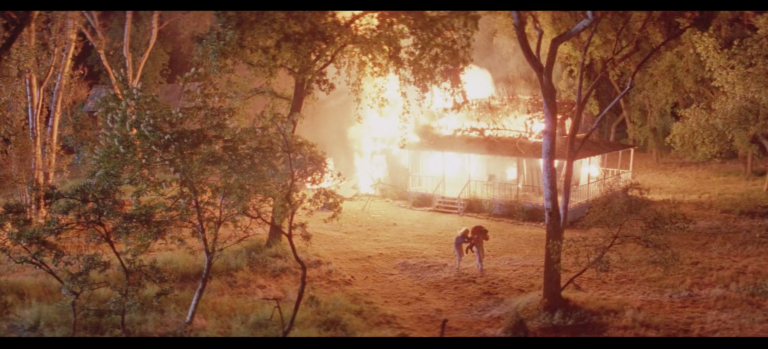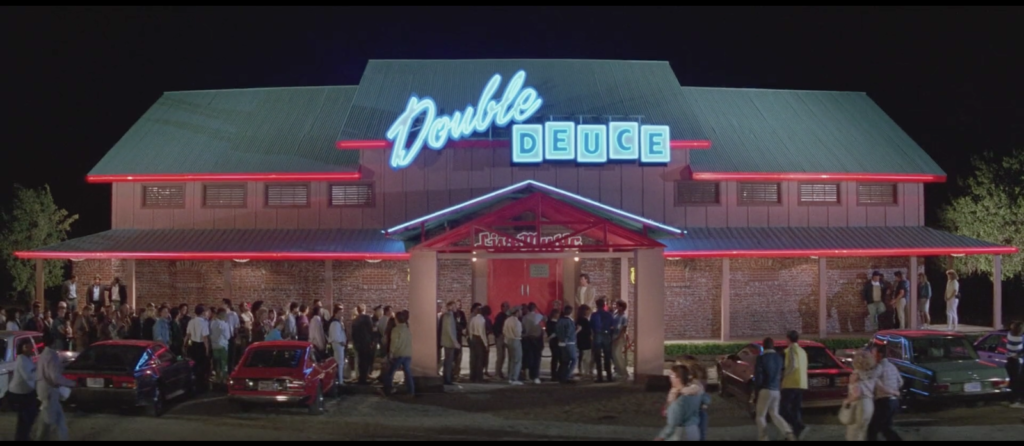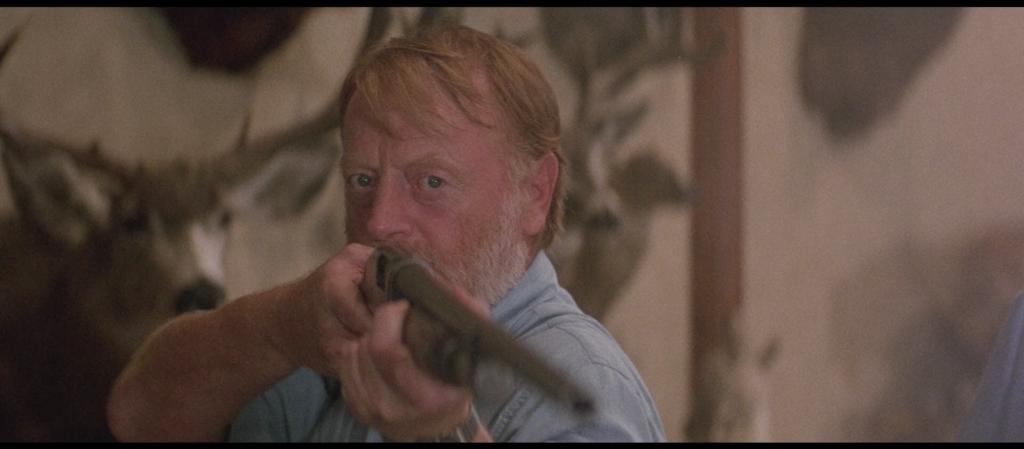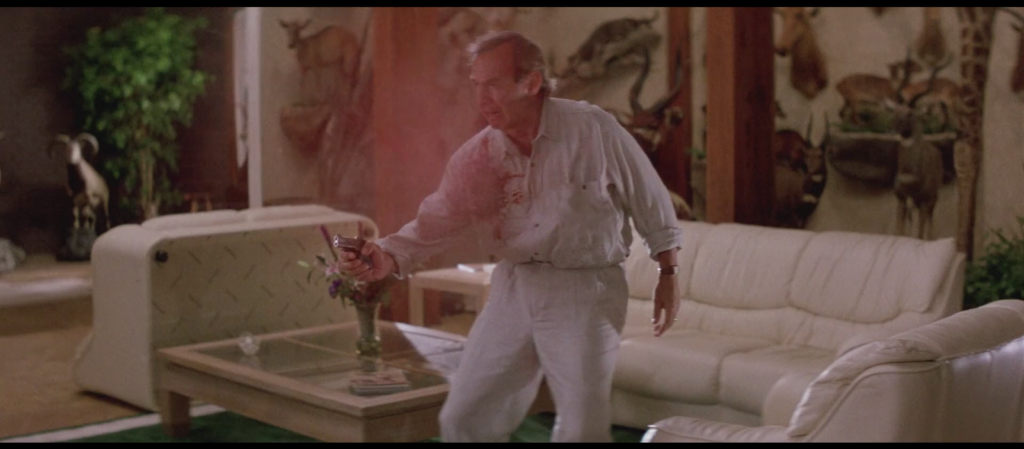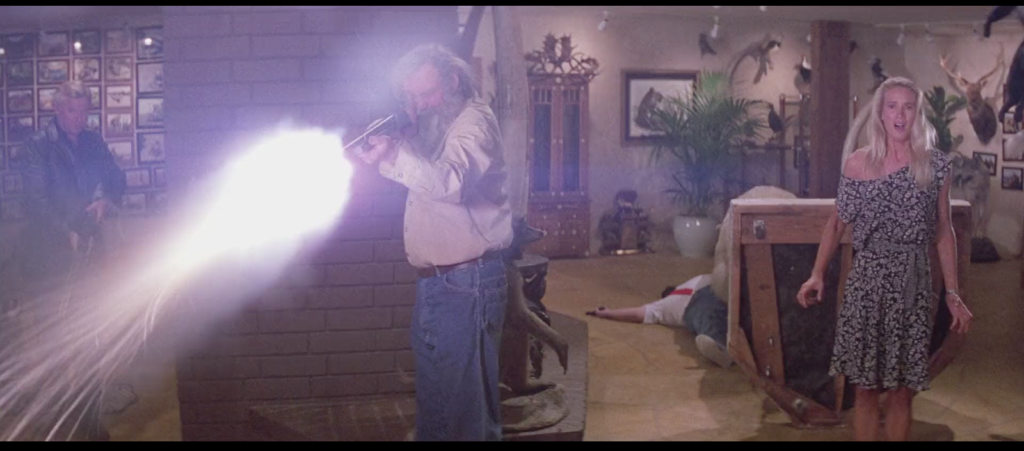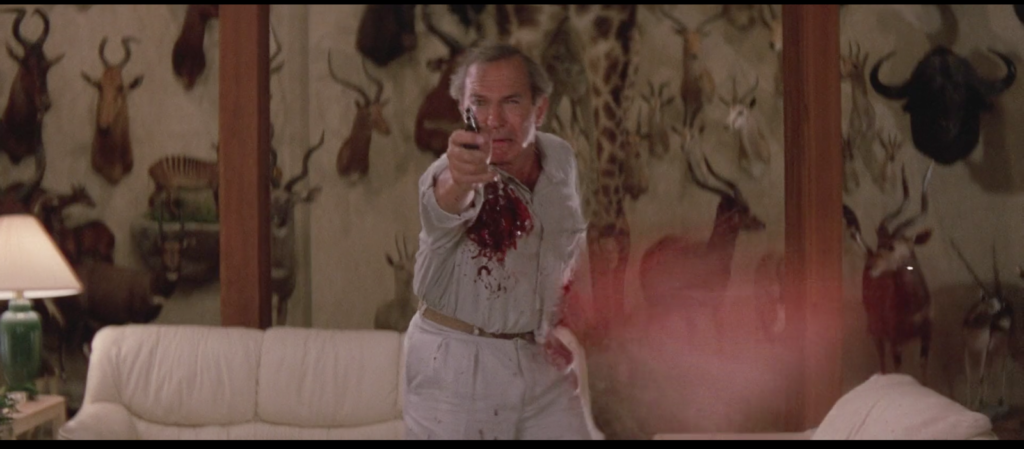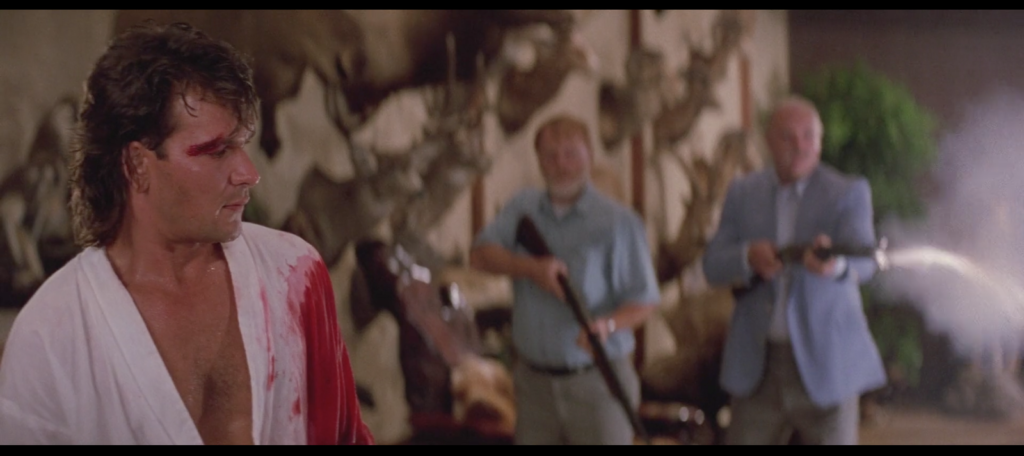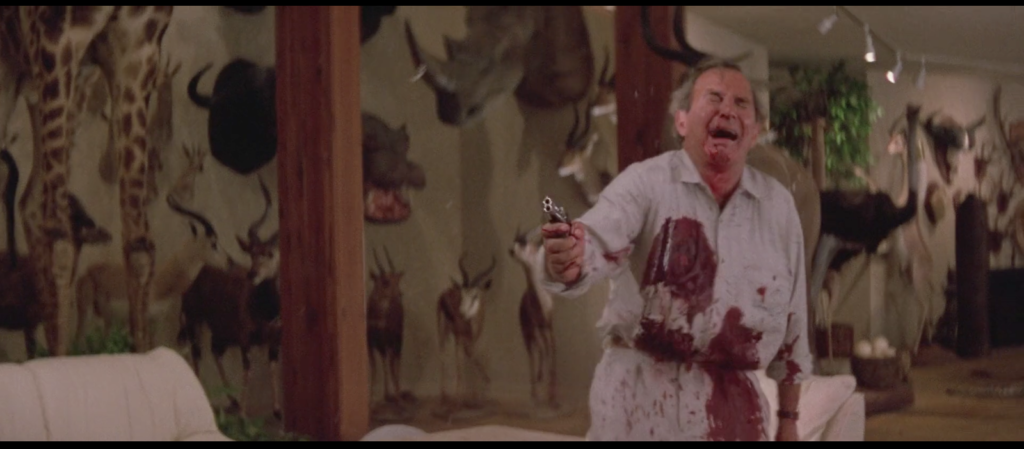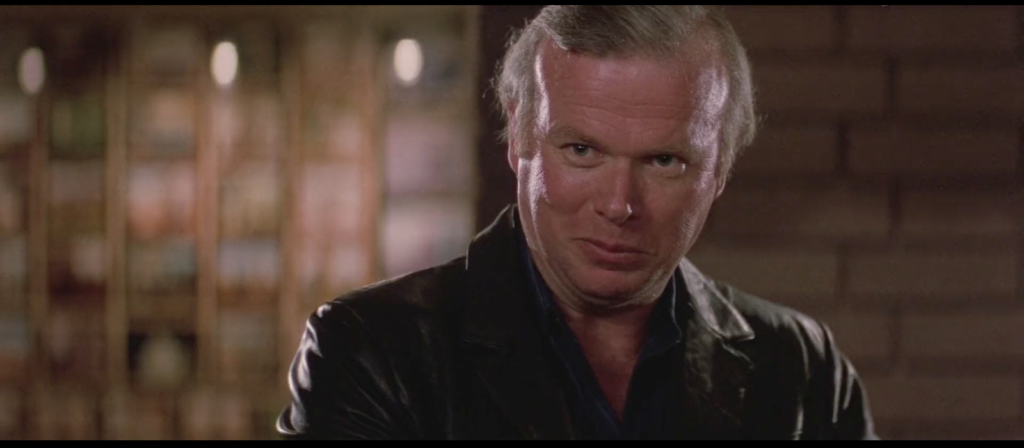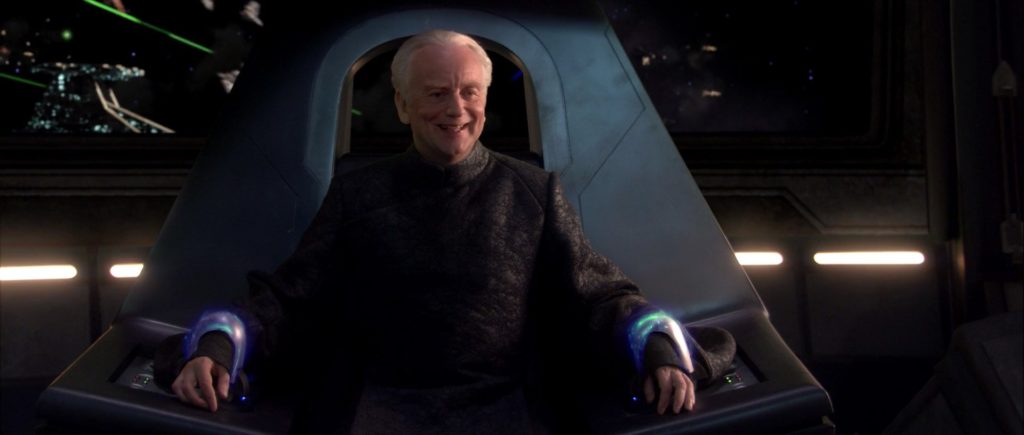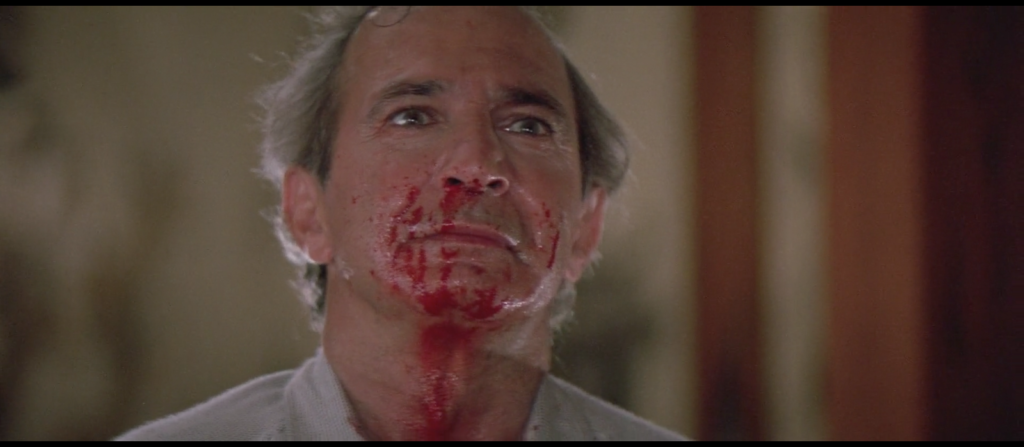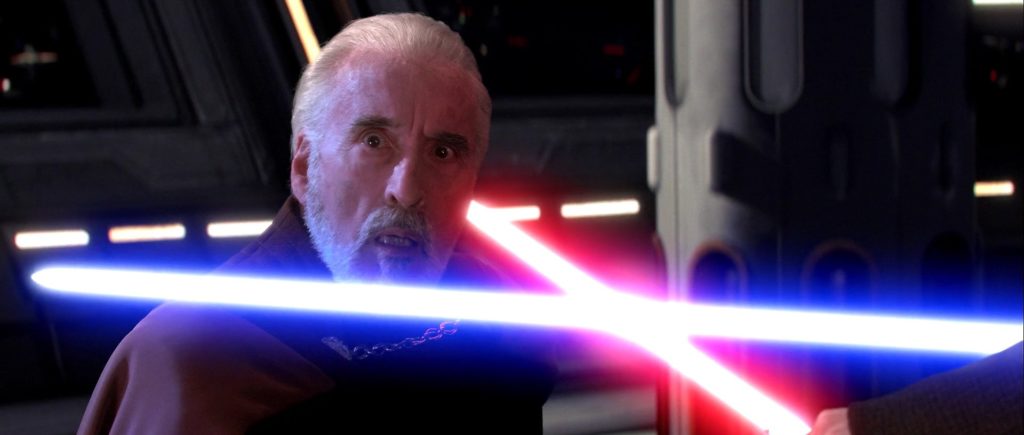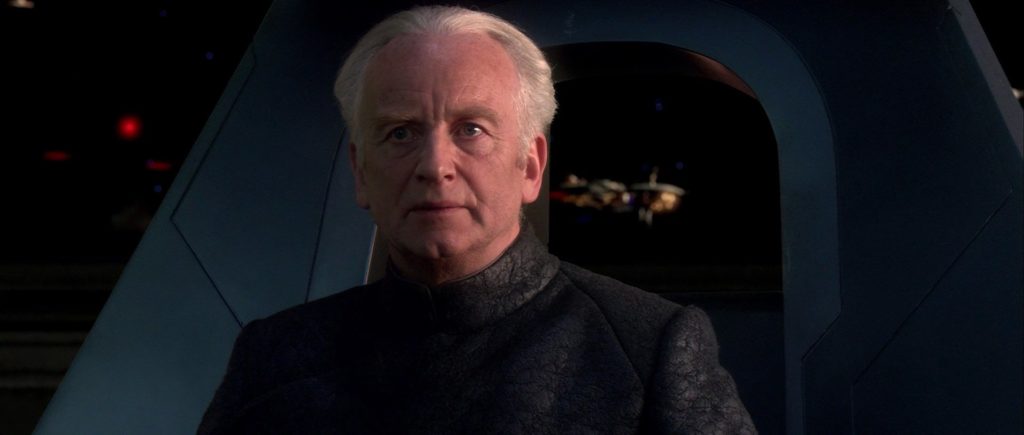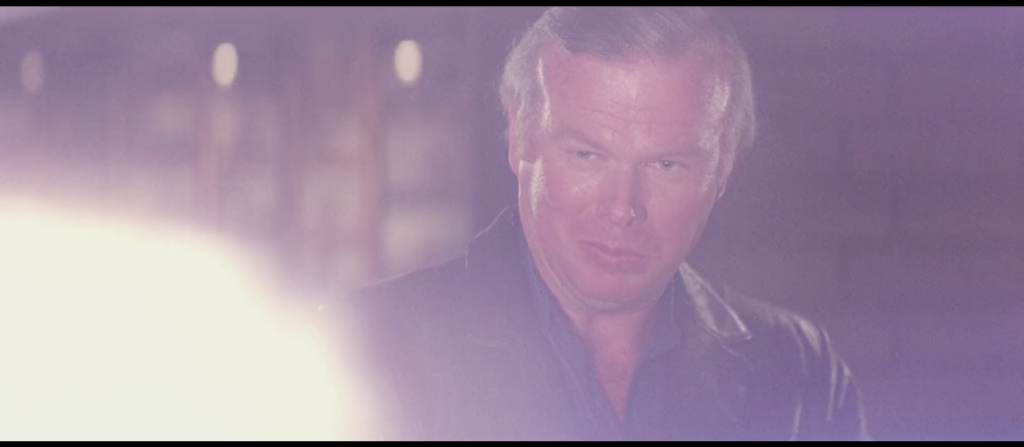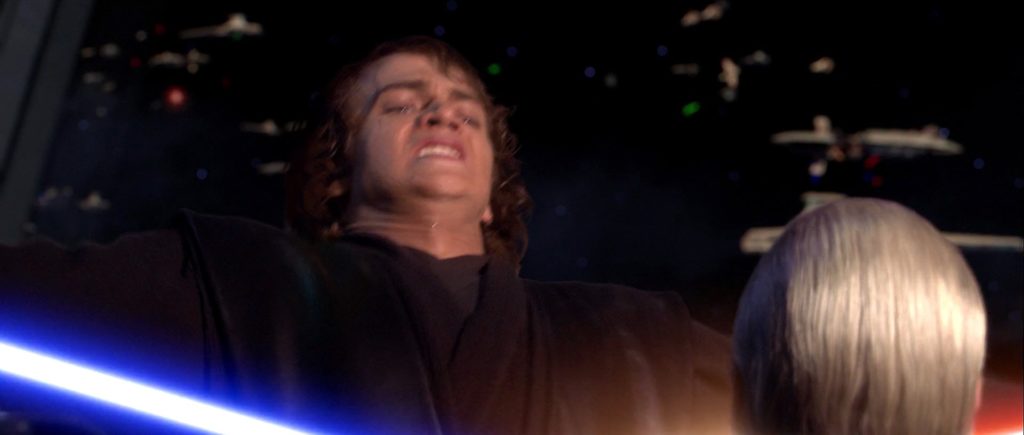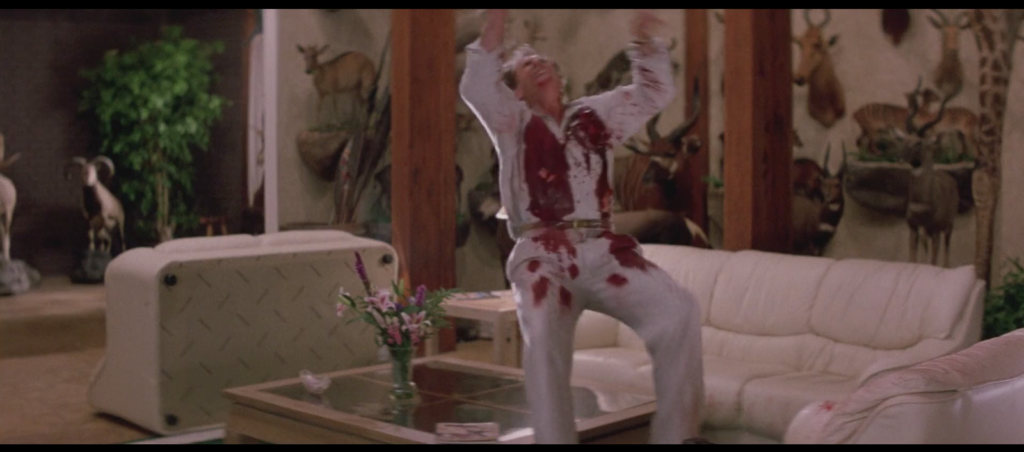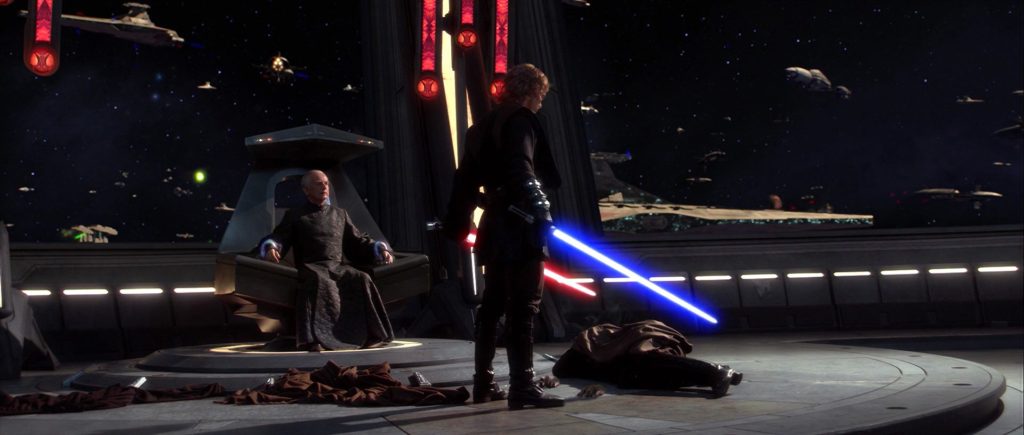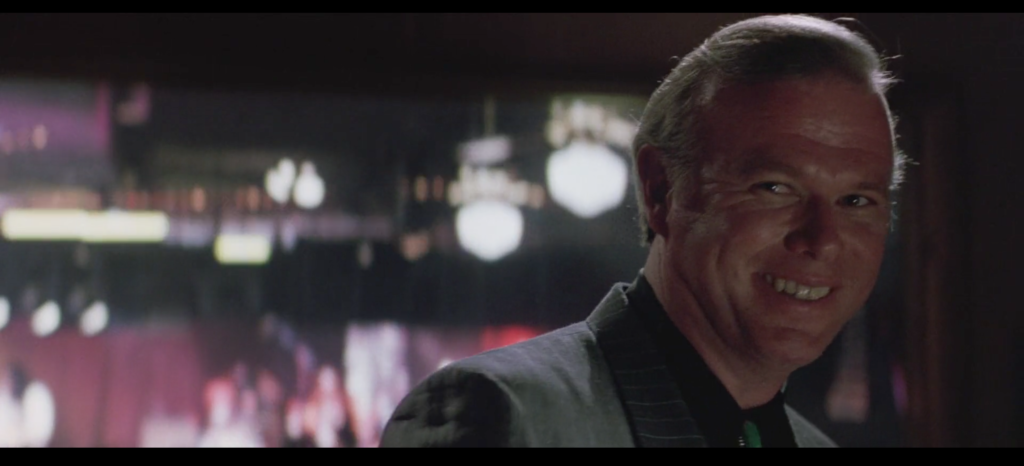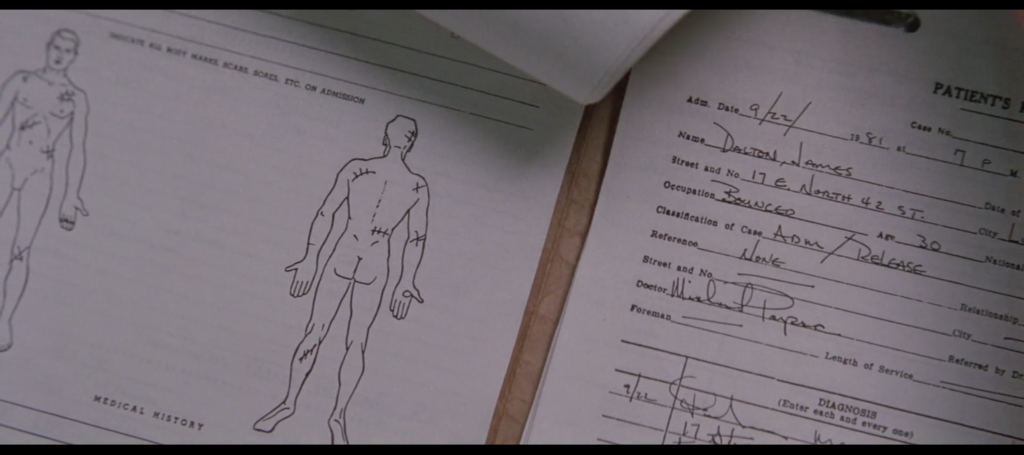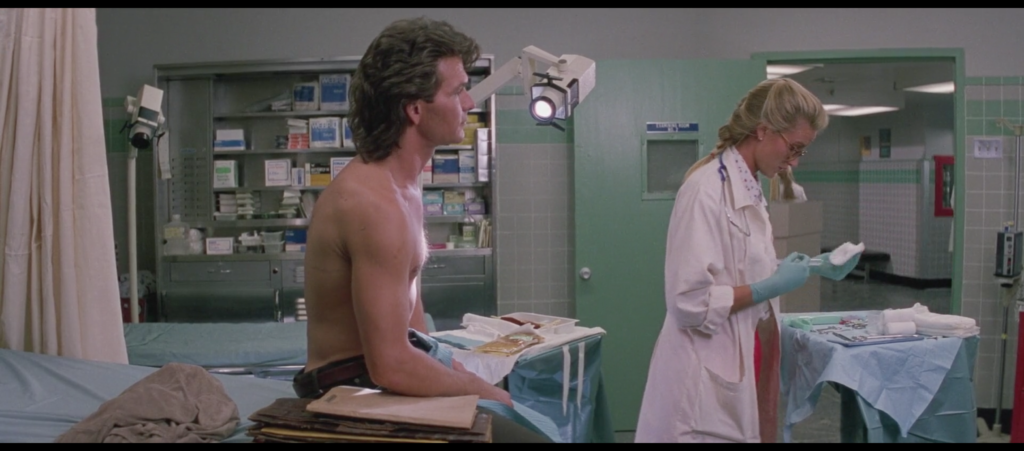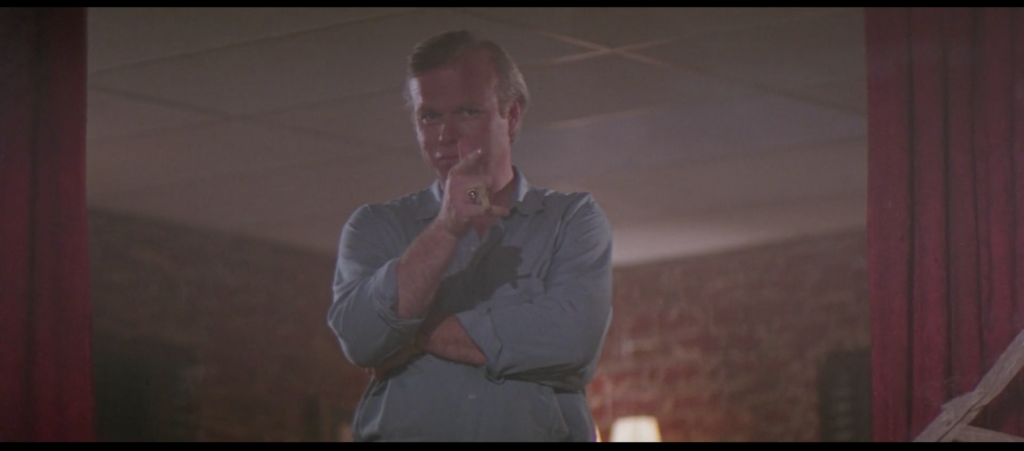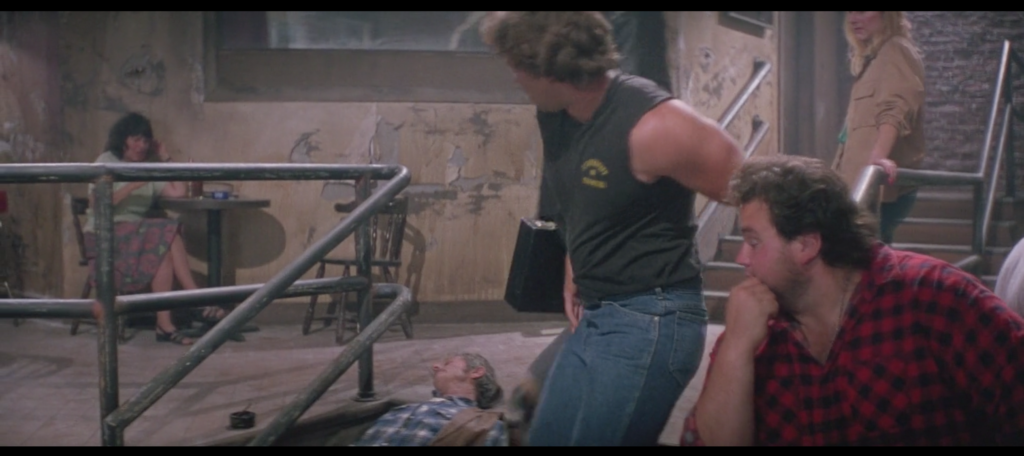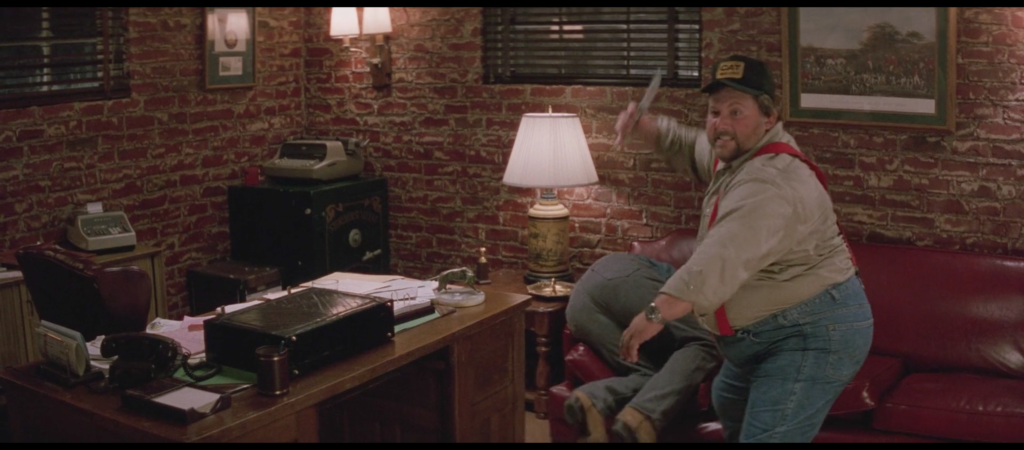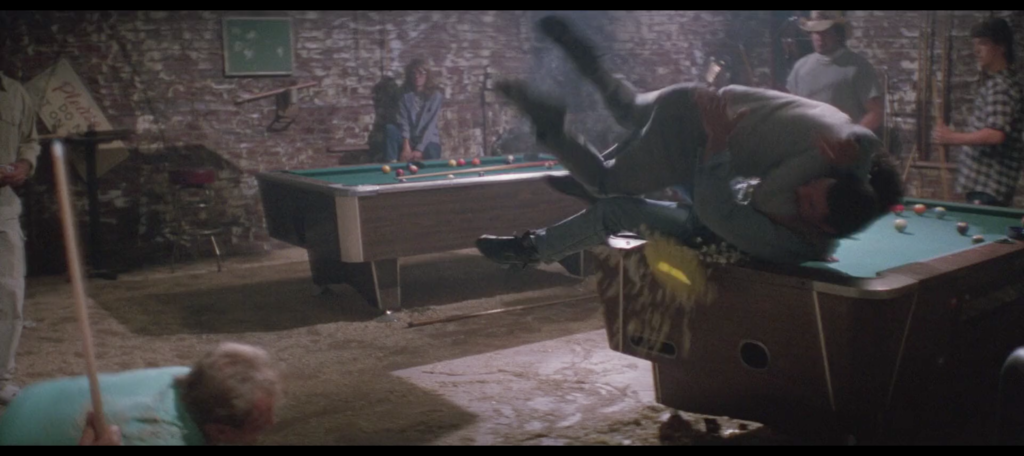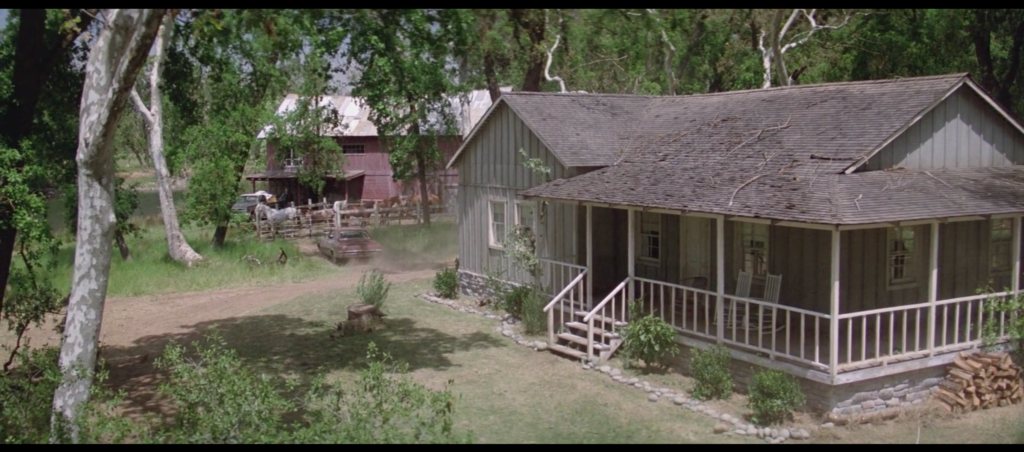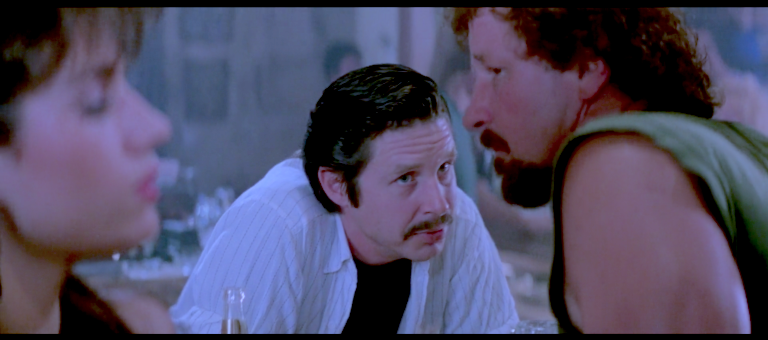Posts Tagged ‘road house’
109. We’re not so different, you and I
April 19, 2019“What he says, goes.” “It’s my way or the highway.” “It’ll get worse before it gets better.” Few action-movie cliches go unuttered in Road House, along with several no action movie has ever used before or since. (“I sure ain’t gonna show you my dick.”) Remarkably, however, we never get a good “We’re not so different, you and I” out of Brad Wesley. There are moments when it seems he’s coming close—Mike Nelson notes this during the climax in his excellent solo RiffTrax on the movie, the first of three or four he and the other MST3K vets have recorded—and the Doc draws the parallel herself when things get really hairy, but the villain whose specialties are taunting Dalton and opening JC Penneys never goes there.
Given Rowdy Herrington’s direction, perhaps actually coming out and saying it would be gilding the lily. No, no one says “We’re not so different, you and I.” But in scene after scene both Dalton and especially Wesley react to annoyances and misfortunes with the exact same way. They cock their head to the side, shake it in “get a load of this” disbelief, and half-smile “ya just gotta laugh”–style. Dalton does it when he emerges from the Double Deuce after his first night of work and discovers his car has four flat tires, a broken antenna, and a shattered windshield (Nelson, in his RiffTrax again: “I have hours of backbreaking labor ahead of me. It’s actually pretty funny!”); Wesley does it the very next day when he spots Dalton practicing tai chi. You get variations on it for matters as minor (no pun intended) as Dalton finding Steve in flagrante with a young lady in the back room, and as grave as Wesley walking through his mansion and discovering the dead bodies of all his henchmen. Wade Garrett and Elizabeth may not do the head-shake thing but they spend the entirety of their three-person date with Dalton grinning at each other in that same can-you-believe-it way.
It can hardly be said that Ben Gazzara and Patrick Swayze have similar acting styles or training, so I can only assume this was Harrington’s go-to instruction, like George Lucas’s infamous “faster, more intense” on the set of Star Wars. But like so many of the film’s other foibles this winds up feeling both endearing and unique. Vandalism, tai chi, dead bodies, people fucking during their 15 minutes—Road House‘s reaction to each is “grin and bear it,” and there’s no other film with quite so untroubled an outlook on the totality of human experience. As Red Webster put it, “That’s life. Who can explain it.”
108. Dead man revisited
April 18, 2019“You’re a dead man,” Morgan tells Dalton when he gets fired. Carrie Ann, Morgan’s now-former coworker, may not share his idiosyncracies regarding where to place the emphasis when speaking, but she does share his sentiment.
The morning after Dalton’s momentous first night in the Double Deuce’s employ, Carrie Ann heads over to his luxury barn to feed him breakfast and, lucky for her, see his bare ass and reenact that gif of Ariel the Little Mermaid leaning on a rock as a huge gush of water erupts around her as a result.
But she brings business to go along with her culinary and visual pleasure. Firing Pat McGurn, one of the Double Deuce’s bartenders, is something Dalton should not have done, she tells him. As a mostly mute (but for grunting and an admittedly sincere-sounding “thank you”) Dalton sits down with a lit cigarette in his mouth and no shirt on his torso, disgustedly tossing aside the bacon and egg sandwich or whatever it is she brought him and moving in on the coffee, Carrie Ann starts cracking up while saying “Oh my god.”
“What is the joke,” Dalton asks, sounding like a cop on a TV show who just got a call at 3:30am saying there’s been another homicide down at the docks.
“Well, there’s no joke,” Carrie Ann says. “I just think I’m looking at a dead man, though.”
“Seems everywhere I go I hear that same joke,” Dalton mutters, shaking his head.
“Yeah? Well, something tells me you bring it on yourself,” Carrie Ann says saucily, nibbling on her breakfast in eating the popcorn/sipping the tea mode.
The variation in affect between the two actor makes it tempting to write this scene off as a minor bit of light-comedy character building. Dalton, who is hung over from a long night reading A River Runs Through It, is gruff and world-weary, too tough to worry and too tired to care. This is just how he lives his life: an endless cycle of naked wake-ups, shirtless stretching, cigarette-flavored coffee for breakfast, some tai chi or perhaps hitting the heavy bag for a workout, grabbing an unstructured jacket, heading to work to get stabbed by various men in the course of kicking their asses, repairing the damage done to his car by those men on their way off the premises, driving back to his luxury bachelor pad right next to the horse pen, taking off his shirt, reading a book, spying on Brad Wesley’s in-ground pool orgy, and finally doffing his jeans and hitting the sack. If during the course of those events people pronounce him a dead man, it’s a job, it’s nothing personal. And Carrie Ann is just the platonic female foil, the funny best friend, who’s able to poke holes in his machismo but not actually call his narrative into question or anything of that threatening nature.
But Carrie Ann, the drinking man’s Cassandra, also knows well that the only person who can truly save Dalton is himself. A warning out of professional courtesy, a gesture of solidarity with a new friend, an excuse to go over to the hottest guy in town’s place—it’s probably all three of these things. But in reality what he’s saying is “I can’t help being what I am,” as a stoic positive; she’s saying it too, but as a cheerily black-comic negative. Worst of all, it’s a direct challenge to the Rules. All that talk about expecting the unexpected, remembering it’s a job, it’s nothing personal, be nice until it’s time to not be nice, watch my back and each others’, and so on…earns him death threats “everywhere I go”? Okay dude, her twinkling eyes and cocked head seem to say, it’s your funeral. We’d expect no less of a dead man.
107. Dalton’s back
April 17, 2019Broad-shouldered, slim-waisted, corded with muscle, Dalton’s back is a perfect thing, an inverted arrowhead of sex. The sun glistens and gleams from every sweat-soaked ridge and cleft. At times you’d swear it’s a source of light itself. The camera orbits Dalton throughout his riverside tai chi routine and his whole body, or at least the upper half which is mostly what you see, is a marvel of course. But his back looks like it was manufactured, by the company who designed the clockwork opening credits for Game of Thrones maybe, or the people who adapted H.R. Giger’s artwork into sculptures for his house. During his waterside tai chi routine both Emmett, his friend, and Wesley, his enemy, stop what they’re doing and just…stare. It’s impossible to blame them. Or us. Dalton’s character is built on the sense that his many aspects—fighter, lover, road warrior, philosopher, rich famous guy, aw shucks everyman, killing machine, pacifist, beer-drinker, binge-reader, master, apprentice—all work in concert to make the man. Road House too, when appreciated properly, is less a film than an ecosystem: hyperefficient factory-made late-’80s star vehicle, barely competent incoherent MST3K fodder, rock-solid action flick, more obvious than usual homoerotica, smarter than it looks, dumber than it realizes, a Ben Gazzara film, a Terry Funk film. When you watch Dalton’s flawless, godlike arms and traps and shoulderblades flex and contract in harmony, you’re watching the character and the movie in metonymy. You’re watching a real physical thing, Patrick Swayze’s beautiful beautiful body, do what Patrick Swayze’s character and Patrick Swayze’s movie are also doing. As below, so above.
106. Sightings
April 16, 2019Flipping through my copy of Road House today, waiting for inspiration to strike, I came across one of my favorite goofy moments in the movie: Brad Wesley stopping his ATV, which he’d been driving around he lawn of his mansion or something I guess, in order to watch and gently scoff at Dalton doing tai chi across the river. The combination of factors at work here—a shirtless and glistening Patrick Swayze performing tai chi on the Missouri farm where he lives during his stint as making six figures at a local shithole as part of his career as a famous bouncer, a deranged JC Penney enthusiast finding this interesting enough to park his Big Wheels and watch but ultimately come away unimpressed, as if he’d expected better form, or a dryer torso—is irreplicable in any other film.
But something hit me about Dalton, as seen from Wesley’s point of view in this moment. Something that I have seen in another film, albeit not a feature. Something that comes close to capturing our sense, and perhaps Wesley’s sense too, that when we look at Dalton we’re seeing something that defies comfortable categorization. Something wild, mysterious, dangerous, untamed, and all but extinct.
105. Fate
April 15, 2019One hundred essays into a year-long Road House writing project, I feel about the film’s attempts to coin catchphrases and aphorisms exactly the way I felt when I’d written no essays at all: yikes. I mean, Does a hobbyhorse have a wooden dick, folks. Balls big enough to come in a dump truck. The writers have a relationship with the English language only slightly less estranged than their relationship to male sex organs.
But they can’t all be losers.
Just after the dump truck incident, a grumpy Morgan (there is no other kind of course) stomps over to Cody, whom he knows has a preexisting relationship with their mysterious new colleague. “This Dalton character,” he grumbles, “what’s his story?”
“His story is, you fuck with him and he’ll seal your fate,” Cody replies.
Now that’s how it’s done.
It’s a marvelous exchange insofar as it’s a rare moment when two characters have a conversation during which Dalton is neither a participant nor present. These are few and far between in this film, to the point where they stand out like sore thumbs each and every time. Off the top of my head, there’s this conversation, there’s Brad Wesley beating up the bleeder, Wesley and Jimmy talking to Red briefly after Dalton departs his store, and Jimmy and Ketchum spying on Dalton and Elizabeth from afar. Unless you count Wade Garrett breaking up shenanigans at a strip joint prior to receiving a call from Dalton, or Wade Garrett asking for Dalton’s whereabouts when he arrives at the Double Deuce, or Wesley’s goons making small talk prior to Dalton’s final assault on the Wesley compound, or Steve and Agnes doing their regular Saturday night thing before Dalton pops in and fires him—all of them scenes that exist so that Dalton can join them in progress—that is it. This is Dalton’s world, and what a treat to see other people live in it.
And who are the people in question this time around? Blind white blues musician Jeff Healey and hardcore wrestling legend Terry Funk. For Road House fanatics this is like the De Niro/Pacino diner scene in Heat.
But don’t think it’s just some goofy novelty act. (I didn’t say “Don’t think it’s some goofy novelty act,” mind you, I said “Don’t think it’s just some goofy novelty act.) Throughout this project I’ve been impressed by what the…let’s say non-traditional actors bring to the table. The naturalism Terry Funk brings to his role as an enormous man who gets paid to get angry and beat the shit out of people with tables is obvious. But spare a thought for Jeff Healey, too, who sounds like exactly what he is supposed to be: a guitar player chatting with dudes in bars. It works when he’s serving as a welcoming presence for Dalton, the one character he neither needs to intimidate nor impress, and it works when he drops the “hey man lemme put this here guitar down and buy you a beer” schtick and describes his friend like he’s the fucking Shogun Assassin.
Because that’s the message of “you fuck with him and he’ll seal your fate,” isn’t it. He won’t just kick your ass, or kill you, or make you wish you were never born or blah blah blah. Like a Norn with a mullet, he’s got the thread of your life in his hands, and if you step to him you’re going to find out exactly where that thread ends.
There’s another implication here that must be considered: Fate is predestined. Cody’s description of Dalton, then, is of one who will mete out the appropriate and appointed sanction to those who cross him, no more and no less. Perhaps it will be your fate to disappear from the movie a third of the way through and never return, like Karpis. Perhaps it will be your fate to pass out from terror when a stuffed polar bear is dropped on you and then emerge reborn, your sins forgiven, like Tinker. Perhaps it will be your fate to be murdered offscreen while wearing moonboots, like Morgan. Whatever the case, Dalton is not making the news, he’s simply delivering it to your doorstep.
It’s precisely the right description for the Dalton Path. Remember Rule Three, Verse Four: “It’s a job. It’s nothing personal.” What can be more impersonal than fate? And who better to do the job of sealing it?
104. I Thought You’d Be Bigger Vol. 2: Cody
April 14, 2019For a recurring joke, “I thought you’d be bigger” gets deployed with a pretty broad affect range. The first person we hear say this to Dalton is Frank Tilghman, whose delivery is difficult to characterize in any way but sexual. The second is Cody, lead singer of the Jeff Healey Band in the Road House Universe, and his delivery could not be further removed from his and Dalton’s mutual employer.
Dalton arrives at the Double Deuce, takes in the scenery, and discovers that the bar band are old friends. He sneaks up on the lead singer with the help of his identical and yet somehow not related bandmates, with a theatrical finger-to-the-lips Marian-Madam-Librarian “shhhh” gesture he shares with each. He hands Cody a towel to mop up the accumulated sweat and projectile beer on his face, for which Cody thanks him. “You play pretty good for a blind white boy,” Dalton says, beaming. Recognition dawns in Cody’s face. “Yeah, and I thought you’d be bigger,” he jokes, and the two embrace, laughing.
I’m gonna level with you: I love this moment. Why? Because it’s one of the only times in the film where Dalton is completely at ease. He’s been reunited with an old friend, a peer, not someone he has to impress, not someone he has to instruct, not someone who mentored him, not someone he needs to mentor. They know each other well, but as colleagues rather than sensei and student. They pass feverish gossip about old times and current times: “Man, this toilet is worse than the one we worked back in Dayton,” Cody says. He also mentions that he and “the boys” heard Dalton was headed to Jasper, presumably from Tilghman, although word among barfolk travels far and fast of course. Dalton therefore does not need to dazzle Cody, nor earn his respect. Cody’s been sitting on his barstool on stage, guitar in his lap, waiting to welcome Dalton with open arms. Anyone would be happy to step into that situation.
But most important of all is that this exchange is just that: an exchange. Dalton ribs Cody in a way he is, presumably, accustomed to being ribbed—that his chosen genre and evident skill are anomalous given his race and disability. Cody thinks this is funny to hear, which indicates he’s heard it a million times before. He uses “I thought you’d be bigger” as a riposte, indicating that these two have shared late-night “You know what people say to me all the time and totally drives me nuts?” conversations over Miller Genuine Draft when the patrons of that toilet in Dayton have long since retired for the evening.
The point I’m trying to make is this: While Tilghman’s “I thought you’d be bigger” is off-putting and invasive, Cody’s is familiar, friendly, and inviting. Eat your heart out, Snake Plissken and “I heard you were dead.” Patrick Swayze and Jeff Healey just took you to catchphrase school.
103. Dump truck
April 13, 2019This much, at least, is not in dispute: When Dalton’s first night at the Double Deuce is winding to a close, Morgan, who is skeptical about the man’s physical prowess, tells him the following.
“You know, I heard you had balls big enough to come in a dump truck, but uh…you don’t look like much to me.”
“Opinions vary,” Dalton replies, and Morgan is temporarily bested.
But while that may settle the issue for the involved parties, we are left with unanswered questions. To wit: When Morgan says he’s heard Dalton’s balls are big enough to come in a dump truck, does he mean A) a dump truck is required to carry them on account of their large physical size, or B) a dump truck is required to receive Dalton’s ejaculate load due to the copious amounts of semen his big balls produce? “Come” as in “arrive,” or “come” as in “cum” as in “ahh skeet skeet motherfucker”? As Dalton himself might say, opinions vary.
Below you’ll find the best cases I can make for and against the two competing interpretations.
Morgan means “come” as in “travel”
PRO:
- Saying someone has “big balls” is a way of saying they’re unusually gutsy or tough, traditional characteristics, one would think, of a famous bouncer
- Dump trucks are known for carrying things placed in them and can accommodate substantial size and weight, making for a strong metaphor
CON:
- Placing his gargantuan sack in a dump truck would leave the rest of Dalton’s body at something of a loss were the truck to go anywhere, the Double Deuce’s parking lot for example
- Dump trucks typically transport dirt, rubble, or refuse, none of which describe Dalton’s testicles
Morgan means “cum” as in “bust a nut”
PRO:
- The measure of a man’s balls could in theory be taken by the size of the receptacle required to contain a full emission of his seminal fluid; from this we can infer that were the bed of a dump truck required to catch all of Dalton’s ropes in their entirety, his yarbles must needs be very big indeed
- Simply weighing or determining the circumference of Dalton’s ballbag implies passivity on his part, while the thought of Dalton milking, or causing a third party to milk, his dick into the back of a construction vehicle demonstrates the activity and agency becoming of a bouncer
CON:
- Dump trucks are not recommended vehicles of liquid waste; absent a watertight truck bed Dalton’s jism could seep through the seams and on to the road surface below, causing a potential traffic hazard and thus negating the central idea of the metaphor as a means to convey his professional clout and skill
- The size of Dalton’s cock, which due to the nature of the orgasmic process would play an indispensable part in the process of cumming into a dump but not in the process of simply transporting Dalton’s huevos in one, goes conspicuously unremarked upon
CONCLUSION:
Occam’s razor suggests Morgan means he’s heard that Dalton’s balls are so big he would not be surprised to see them being carried by a dump truck, not squeezed like lemons into one. However, the imagistic approach of the latter interpretation has much to recommend it as a hypothetical alternative.
102. Mirror
April 12, 2019101. The Third Rule, Verse 4
April 11, 2019“This is the new Double Deuce,” says Frank Tilghman. We are at the start of an all-hands staff meeting, and Tilghman is pointing to the concept art for the bar’s redesign. But standing nearby is his latest hire, Dalton. It is through Dalton, with Dalton, in Dalton that the new Double Deuce will be achieved. Dalton embodies the new Double Deuce. He is its future.
When Dalton takes over as cooler he becomes more than just the chief bouncer. His role is not to handle a series of discrete incidents, but to institute sweeping reforms that will eliminate such incidents forever. “It’s going to change,” he states—not a threat, not a promise, a fact. His bouncers, too, must change for this to take place. As below, so above.
Bouncing on the Dalton Path is a matter of following “three simple rules.”
This, for the fourth time, is the third.
3. Be nice (continued)
“I want you to remember,” says Dalton, “that it’s a job. It’s nothing personal.”
Thus far, Dalton has explained the third and simplest of his Three Simple Rules in comparatively painstaking detail. He has articulated its Great Commandment. He has preached the Parable of Someone Getting in Your Face and Calling You a Cocksucker. He has emphasized its communal nature. And now he says it’s nothing personal?
I’d like to take this opportunity to introduce you to a man named Gyp Rosetti.
ROSETTI: “Bone for tuna.”
TONINO: What?
ROSETTI: “Bone for tuna.” What the fuck’s that’s supposed to mean?
TONINO: Oh. The kid’s Irish. The pronunciation was off. I think he meant—
ROSETTI: I know what he meant. Who the fuck is Nucky Thompson to wish me good luck? And in Italian, no less, like he’s mocking me? He’s real cute, I’ll fucking tell you. Sets me up to lose, pulls our whiskey deal at the last minute, then it’s buon fortuna like he’s rooting for me to get back on my feet. Push me off a cliff, why don’t you.
TONINO: Sure, I mean—
ROSETTI: Good luck flapping your arms on the way down! Am I right?
TONINO: Sure, I mean—
ROSETTI: Real attitude on him. Scrawny Irish prick. I need his blessing to make my way in the world?
TONINO: He w—
ROSETTI: I need him? To lecture me? “Nothing’s personal”? What the fuck is life if it’s not personal?
So you can see Dalton’s dilemma. Here he is, new in town, new in the job, new to these men, whose job it is to physically fight, restrain, and eject other men. His first order of business is to fire two of their coworkers, neither particularly well-liked, but each emblematic over his power over their employment and thereby their lives. He’s told them It’s my way or the highway and rattled off a list of undesirables who frequent the bar, a state that’s going to change. The implication is clear: His way is superior to theirs, which has demonstrably failed. From there he launches into a disquisition on bouncer conduct that is rife with paradox and contradiction as well as comprising a nearly diametrically opposed approach to the craft than that which they have heretofore pursued. After all this, after telling these violent men how to do their violent jobs by moderating their interactions with other violent men under the threat of termination, Dalton has the temerity to tell them that when the time comes and they are being pelted with verbal and physical abuse and they must decide whether and how to strike back, that all of this is nothing personal? Doesn’t he see how they would take this? Doesn’t he know it reads as insanely pollyannaish at best, insulting at the most reasonable, and downright dangerous at worst? When confronted with well-meaning advice by someone with whom you are at odds—and what is a worker if not at odds with the boss—even the most anodyne bromide, like wishing an associate “good luck” in his native language when a business deal goes south, feels like fighting words. Doesn’t Dalton realize that telling these men in this context that this job is nothing personal is tantamount to throwing down the gauntlet and fucking daring them to take it personal?
Yes. Yes he does.
If you think this sentence is confusing, then change one pig.
(to be continued)
100. Pain don’t hurt
April 10, 2019Look, all he’s saying is that it doesn’t bother him that much. Why would you doubt him? You’ve just read his life story in the form of a medical file. Thirty-one broken bones, two bullet wounds, nine puncture wounds, and four stainless steel screws. To these you are about to add nine staples, to close the knife wound he incurred in the process of physically fighting multiple armed attackers in his employer’s office. He’s a bouncer by trade, and taking it is as much a part of the job as dishing it out. More so, perhaps. The fight has to come to him, not the other way around. Until someone’s ready and willing and able to hurt him he’s off duty. So he turned down the anesthetic, so what. Pain is how he clocks in.
But there’s more to it than that, you suspect. Because the non-standard subject-verb agreement is…it’s cute, you guess, but you know he knows better. In that job, with that body—you’ll afford him the working-class hero affectation, but that’s what it is. Again, you’ve read his medical file. You know he went to NYU. You know he keeps this information in his medical file, for some reason. You suspect, in the minute you’ve known him you suspect, that he’s put real thought into the things he says, for better or…
Beautiful eyes. Blue. He has a blue-eyed smile, too, you think, unsure what that means, sure that it’s right.
You’ve been with violent men before. There, now you’ve thought it, now it’s out in the open. Not with you, never with you, not really, no not really, though you’ve heard things since then that you have a hard time believing yet also believe the moment you hear them. What’s that girl’s name? The blonde woman. She was with one of his boys, and you were with him, and you left town, and he went nuts, and now she’s with him and the boys have moved on, you suppose. Not with you, though, not really.
But Brad didn’t need to hit you to hurt you. His charisma, his worldliness, his ease with success, the way he promised you everything and meant it: When you saw it for what it was—for its casual cruelty and gross acquisitiveness and lack of empathy and small-minded understanding of what “everything” even means—and the life you’d planned to last forever kindled and burned and crumbled to ash in the light of it, oh, he hurt you then. He hurt you so badly you ran to get away from it, like the feelings lived in that godawful mansion and you could leave them there mounted on the wall, immobile, unable to reach you again.
Has he ever been hurt, you wonder? Hurt like that, you mean? Has Dalton comma James, he of the thirty-one broken bones, two bullet wounds, nine puncture wounds, and four stainless steel screws—and nine staples, don’t forget those—has this man who literally trailed blood into your hospital tonight ever tried to run away from the pain, only to learn just like you did that you take it with you no matter where you go?
You want to check his medical file for the answer. You wonder if maybe it’s on the same page that lists his alma mater. You want to laugh but that would be inappropriate.
But you have your answer. You may not want to believe it, because it’s safer not to. But the working-class hero with the NYU degree and the studiously sculpted body and the equally studiously sculpted speech, with the blue eyes and the smile, with the thirty-one broken bones and two bullet wounds and nine puncture wounds and four stainless steel screws and, soon, nine staples—he told you already.
He told you, when he said Pain don’t hurt.
No, you think. By comparison? No. No, it does not.
You’re still smiling, you realize, you’re still smiling and he’s still smiling as you turn to grab the stapler. As you feel his body through the latex of your glove and begin to repair what was broken you think Pain don’t hurt and you wonder how long the smiling will last.
099. The Phantom Menace
April 9, 2019WESLEY: This is my town. Don’t you forget it.
DALTON: So what does he take?
RED: Who?
DALTON: Brad WesIey.
RED: Ten percent…to start. Oh, it’s all legal-like. He formed the Jasper Improvement Society. All the businesses in town belong to it.
DALTON: You’ve gotten rich off the people in this town.
WESLEY: You bet your ass I have. And I’m gonna get richer. I believe we all have a purpose on this earth. A destiny. I have a faith in that destiny. It tells me to gather unto me what is mine.
RED: Twenty years I’ve watched Wesley get richer while everybody else around him got poorer.
TILGHMAN: Anyway, I’ve come into a little bit of money.
TILGHMAN: This is our town. And don’t you forget it.
098. James
April 8, 2019Dalton’s first name is James. There it is, in black and white, in his medical file, next to a drawing of his bare ass. (Not technically true, but you have to admit the resemblance is remarkable.) I forget this, frequently. I forgot it for the entirety of this project, until I happened across this frame while searching for something else in this scene, the one where he meets the Doc. Nothing’s gained by knowing Dalton is more than a mononym. For one thing, it costs him a certain air of humility. Jack, Hank, Younger, Ketcham, Karpis, Stella, Judy, the Uncredited Bartender—half the cast is not afforded the dignity of a name uttered onscreen. Why should Dalton be any different? Because he’s the cooler? That presupposes that, like Superman, he is like them but he is not one of them. That’s not a presupposition I’m willing to make. The Dalton Path is a path of humility, and you must trade in your Mercedes for a hooptie in order to travel it. I wonder if Dalton eschews the use of his first name, to the point where no one, not even his lovers and closest oldest friends, even use it, in order to annihilate the self in this way—like a maester dropping his house name, like a nun adopting the name of a saint, like Jack Napier calling himself Joker to represent his broader brighter outlook on life. Maybe that’s why my brain purges itself of this knowledge regularly, and then purges itself of the knowledge of the purging. It’s not like I could tell you when I learned Dalton’s name, but I know that I did, and I know I forgot it, and I know that I’m remembering it rather than discovering it for the first time, and I couldn’t tell you when any of those events originally took place. There’s a bit in Batman: Year One, by Frank Miller and David Mazzucchelli, where the young Batman must dive off a bridge to save the infant of the young James Gordon. In the process he removes his mask, or his mask is removed, or he was dressed as Bruce Wayne all along and had to blow cover to make the save, which was to him more important than preserving his secret identity. Gordon gratefully accepts his still-living child from this strange man, then graciously lies that he’s misplaced his glasses in the confusion, and couldn’t recognize a face glimpsed without them if he tried. I’m sorry; what were we talking about?
097. “Anyway, I’ve come into a little bit of money.”
April 7, 2019Frank Tilghman has just met Dalton for the first time, after what one assume is years of hearing tell of his exploits from other barfolk. He explains he runs a little nightclub called the Double Deuce just outside of St. Louis. It used to be a sweet deal, he says. Now it’s the kind of place where they sweep up the eyeballs after closing, he laments. His face falls, ashen. He looks out over the bustling crowd at the Bandstand, the club where Dalton currently works, but it’s as if he doesn’t see it at all. Then he turns back toward Dalton and, with the most normal facial expression imaginable, he says “Anyway, I’ve come into a little bit of money.”
Oh, is that a fact?
In the past, when fleshing out the romantic backstory between Tilghman and Pat McGurn, I’ve theorized that one of Tilghman’s ex-wives’ doting mother left him a small fortune, having turned out to be much fonder of her daughter’s former husband than the daughter ever was. Perfectly harmless. I’ve also speculated that he was involved in one of those “seduce an old lady, get written into her will, and dump her overboard during a cruise” schemes, like Not Great Bob’s boyfriend did (allegedly) in Mad Men. You have to admit it’s possible.
But look at that grin again. Look at that rictus of arrogance and cruelty. This is the face he’s choosing to display to a man he’s going to spend top dollar on, a man who will turn the struggling Double Deuce into the hottest nightspot in a hundred miles, a man who will run the bad element out of the bar, a man who will almost singlehandedly destroy the organized crime ring run by the richest man in Jasper. Until he dies, that is, slain in the course of the battle with Dalton.
Slain by Tilghman.
The new richest man in Jasper.
You know the 7-Eleven, the Fotomat, the mall, christ, the JC Penney? Brad Wesley brought them to town, he says, and no one contradicts him. But if I were Dalton, I’d spend some of my mid-six-figure yearly salary on a forensic accountant. Shell corporations within shell corporations within shell corporations are involved, I’d imagine. And what address is listed for those corporations, in the end? Whose name is on the dotted line?
Cui bono?
096. Estimate
April 6, 2019“Well, Mr. Dalton, you may add nine staples to your dossier of 31 broken bones, two bullet wounds, nine puncture wounds, and four stainless steel screws. That’s an estimate, of course.”
Is it, Doc? Is it really? Because it sounds to me like you’re at first reading, then reciting from memory, actual statistics from the medical file that Dalton carries around with him. (“Saves time.”) Thirty-one broken bones, two bullet wounds, nine puncture wounds, and four stainless steel screws—that’s pretty specific. Not a lot of guesswork involved, I shouldn’t think. Unless you mean the nine staples you’re about to administer may wind up being ten staples, or eight stapes, and you can’t tell until you start. Or unless previous doctors whose notes are contained in that file threw up their hands and were like “I dunno man, this guy’s fucked up what can I say,” and that this is recorded in the file somewhere, perhaps in the place where it says what college he graduated from, which is admittedly a thing that it says and thus an indicator that this is a potentially very unorthodox medical file.
But if none of this applies, the smart money is on “the writers wanted Doc to say something that sounded smart, like ‘that’s an estimate of course.'” It isn’t smart at all of course. But I’ll say this for Kelly Lynch: She makes rattling off a bunch of specific injuries and then saying “just blue-skying it here” come across like you’re in the presence of a Dead Ringers–level eccentric medical genius. That would explain some of her wardrobe choices, and her taste in men. That’s an estimate of course.
095. Tilghman’s Affect
April 5, 2019Frank Tilghman has affect issues. That’s one way to describe it, and probably a mild way. At virtually no point during the entirety of Road House does the demeanor selected by actor Kevin Tighe track with the reality of his character’s surroundings. It’s why he spends the opening sequence grinning like the Joker even though from a narrative standpoint he’s more like Commissioner Gordon. It’s why he reacts to firing his piece-of-shit bartender (my own headcanon notwithstanding) like he’s getting divorced. And it’s why, when the Double Deuce is in the throes of a full-scale riot launched when a husband with a cuckold fetish decks a dude for refusing to pay to kiss his wife’s tits and his own bouncer goes berserk in response, he signals to Dalton with a smile and a “hey hotshot, come on up and see me sometime” finger point gesture. At that very moment he can see every piece of furniture in his seating area getting smashed into splinters, he can see human beings flying over the bar and into the bottles and glasses behind it, he’s watching people commit felony assault and attempted murder, he’s seeing people incur injuries that will potentially last a lifetime, and his face and body are doing the equivalent of that “chk-chk” sound you make when you wink at someone. It’s possible he’s the weirdest man in Jasper. It’s possible he has less concern for the lives of others than Brad Wesley. The greatest trick the devil ever pulled…
094. Trustees of modern chemistry
April 4, 2019“Bad element over there,” says Brad Wesley of the Double Deuce when he and Dalton first meet. Brad Wesley should know, of course, because Brad Wesley has several of the protons and electrons comprising that bad element on his payroll. That’s the way we tend to think of the Double Deuce’s lowlife patrons, the people Frank Tilghman hired Dalton to clear out. Pat McGurn and Morgan, members in good standing of Wesley’s goon squad, in Pat’s case a thief and in Morgan’s case a rageaholic sadist. Stella, the coke-dealer waitress, and Steve, the bouncer who likes the bar’s patrons and his sexual partners the way Willis O’Brien and Ray Harryhausen like giant gorillas named Mighty Joe: young. Sharing Husband and Well-Endowed Wife, who’ve decided to turn the Double Deuce into a theater for their loveplay. Gawker, who ain’t got twenty bucks. Foxworthy, who sexually harasses Carrie Ann. Nipple to Nipple Guy, who sexually harasses Denise. Men who throw bottles at the faces of blind guitar players when they announce they’re taking a break from the set to use the bathroom. A Knife Nerd in a Hawaiian shirt. Mr. Clean. The Fuckemtheyre Brothers. Tinker. You get the picture.
But look at these two lost souls. No, not Younger and Jack, though I can’t imagine they’re feeling like they’ve found their calling at this particular moment in time. The woman in the upper left is seated alone at a relatively isolated table, where she is having an agitated conversation with no one. She’s screwed up her face angrily, and makes the occasional wild gesticulation. Is she drunk? Yes, probably. Is she also severely mentally ill? Almost certainly. She’s one of Dalton’s infamous “trustees of modern chemistry” insofar as the chemistry in question is lithium.
And that old man passed out on the floor? He’s the one person we see Frank Tilghman involve himself personally in ejecting from the bar, when he orders Younger to give the guy the heave-ho. He’s not propositioning women with his hands, or stabbing anyone, or throwing anyone through a table. He’s an elderly alcoholic who, if he doesn’t sleep there, is going to sleep on the street. “Get him outta here,” Tilghman says. Tilghman, who employs Pat and Morgan and Stella and Steve and has a bar full of the worst motherfuckers on the planet, is effectively installing one of those benches rich areas of big cities use where there’s curves or bars or jagged spikes at regular intervals to prevent any homeless people from getting too comfortable.
What we’re seeing here is the Reagan/Bush-era destruction of the social safety net in microcosm. With mental institutions shuttered due to lack of funds, people wind up out on their own with no one and nothing to help them. Some wind up in the Double Deuce, waving off imaginary interlocutors underneath Tilghman’s office window, or passed out on the steps along the way. Later on in the film Dalton will spare a similar old man—the same old man, quite possibly, though it will require further review—the fate of expulsion from a diner whose owner is pissed that he’s nodding off at the counter. But no such luck here. No one takes this woman or this man and powerbombs them through a table, but they’ve fallen through the cracks nonetheless.
093. When Tinker Attacks
April 3, 2019This, as you know, is Tinker. Broadly speaking he is the comic relief in Brad Wesley’s brute squad, which if you’re familiar with people like Pat McGurn and O’Connor is really saying something. He lurks in the margins of Dalton’s first visit to the Double Deuce, making time with some lady while sitting next to where Morgan’s posted up at the bar. We get our first good look at him approximately five seconds before the Bleeder reads him to filth, to the point where it would probably be better for him if he hadn’t show up at all. His goonsmanship after this scene is largely undistinguished; like most Wesleyans he exists primarily to get his ass kicked, but unlike, say, Jimmy or Ketchum or Morgan you never see him wreck shop in any way. He is the sole survivor among the goons, that’s how little Dalton considers him to be a threat. He gets knocked out of the final fight when Dalton dumps a stuffed polar bear on top of him, during which maneuver Tinker carries on like he thinks the bear has come to life and is about to maul him, like Tuunbaq has come to Jasper to exact further revenge against the colonizers. He is even granted a sort of clemency by the cabal of old men who show up to save Dalton’s ass by Sonny Corleone-ing Brad Wesley: Instead of killing him too, they ask him to participate in the cover-up, which in his own moronic way he does.
But look at this shit up above. Look at it! We’re in Tilghman’s office, where Tinker and O’Connor are muscling him into rehiring Pat. At this particular moment, Dalton is tussling with O’Connor after having broken Pat’s nose and roundhouse-kicked him through a plate-glass window. What did Pat do to occasion this treatment? Whip out a gigantic knife with no provocation and attempt to murder Dalton with it. Having observed all this firsthand, what does Tinker do? You guessed it!
Things wind up going for Tinker much the same as they did for Pat. Dalton kicks him with both feet, forcefully enough to push himself and O’Connor through the shattered window as well. Tinker gets knocked onto the couch, where the other bouncers find him and proceed to immobilize and pummel him. Like one of them holds his arms and the other punches him in the gut. It’s heel tag-team shit, but frankly he deserves it.
Why? Because as we’ve mentioned before, here’s the thing about Tinker: He comes closer to actually killing Dalton than anyone does until the climax of the movie. That knife he whips out and holds aloft like Anduril, Flame of the West? He slashes Dalton in the side with it while Dalton’s in the middle of fending off O’Connor, and if Dalton’s turn toward his new oncoming attacker had been timed just slightly differently his intestines would be hanging out. Dr. Elizabeth Clay would be calling his time of death, not asking what particular philosophical discipline he studied at NYU.
Maybe there’s a lesson in this for us, if we care to look for it. We are all occasionally much better at being ourselves than is our standard. Tinker is, for this brief moment, very good at his job of being a goon—too good, almost, insofar as he came within a hair’s breadth of murdering a man in front of about a hundred witnesses, but good regardless. Most other moments I wouldn’t hire Tinker to whack a piñata, much less the (second) best damn cooler in the business. There’s a Tinker in all of us—a killing machine and a stammering goofus bested by taxidermy. Sometimes you eat the bar, and sometimes the bar, well, he eats you.
092. “Fuck ’em, they’re brothers.”
April 2, 2019Sibling rivalry. Toys, games, grades, sports, popularity, attention, romantic success, money, status, a parent’s love: There are plenty of reasons to fight with your brothers and sisters, and they evolve over time just like you do. It’s hard to imagine now, as a father and stepfather myself, but time was me and my brother would go at it hard, physically, rumbling around in our basement after some dispute or other. Someone would want to play with something the other one had, or was using, or wasn’t using, or some dumb nonsense. I didn’t like how he’d make fun of me sometimes, and I assume the feeling was mutual. We made up mean nicknames for each other. We’d get each other in headlocks and someone would cry and our mom would tell us to knock it off. During any kind of tussle with my siblings—we have a sister too and if she’d join in with my brother I’d like physically back her away by putting my head against hers, which I did to my brother all the time too, like I was moving them with my mind—I’d kind of stick my tongue out of my mouth and bite down on it in determination, which they referred to mockingly as “tongue power!”, which I absolutely hated. It’s wild, that we fought, partially because I’d flip the fuck out if my kids started laying hands on one another, and partially because we always got along. When I think back on my relationships with my siblings (I am the oldest of three) I can’t think of a single time any of us argued or fought about anything in any serious way. The physical spats had no meaning. I think in my last fight with my brother he bloodied my nose, and after that we both realized without saying so that physically fighting each other was a bad idea.
Family relationships take very sharp turns sometimes. Certainly ours has, both within our original unit and in our own lives with our own families. Time and circumstance have shown me, though I didn’t consciously realize it at the time, that I would I would die without hesitation for these people whom I love so much, without any hesitation at all. I’d imagine they’d say the same if I asked them, which I won’t. I’d rather them never need to know.
Anyway, here are two grown men in denim, throwing haymakers and decking each other onto and off of a pool table in the middle of a crowded bar. Who knows why. Who knows why anyone in the Double Deuce during its Mos Eisley Cantina phase does absolutely anything, or why they choose to do it there of all places. “Fuck ’em,” says Horny Steve the bouncer when Hank interrupts his crude attempt to pick up a teenager to point out the altercation. “They’re brothers.” Once they were children who played together, like my brother and I did. Maybe they fought occasionally like we did. Maybe they spent the preponderance of their time, like the vast overwhelming majority of it, playing whatever the period-appropriate equivalent of He-Man and G.I. Joe was, or watching Star Wars or wrestling or The Goonies or Clue, like my brother and I did. And then they grew up and assaulted each other in the worst bar in Missouri. I know roads like that exist for people. I never ever want to go down one.
091. Hillbilly elegy
April 1, 2019090. “That guy in the corner’s fuckin’ Dalton, man.”
March 31, 2019[Chorus: Pat McGurn and Morgan]
I heard Frank Tilghman hired fuckin’ Dalton
And yeah we’re fuckin’ fucked, that guy is fuckin’ Dalton
I heard Frank Tilghman hired fuckin’ Dalton
And yeah we’re fuckin’ fucked, that guy is fuckin’ Dalton
I heard Frank Tilghman hired fuckin’ Dalton
And yeah we’re fuckin’ fucked, that guy is fuckin’ Dalton
He’s firing somebody real, fired by fuckin’ Dalton
Send your goons to the bar, maybe he’ll assault them
[Verse 1: Tilghman]
Hold up, Jasper simmer down
Hiring the best, bitch, now he’s here in town
Flew to New York, saw him shirtless, lookin’ fine
Ooh, baby check him out, you’ll go Jeffrey Healey blind
(Uhh)
Hey Pat, black coffee
Serve this motherfucker cuz he drinks for free
Tell these motherfuckers who they think they see
Put his feet through your teeth then he’ll break your knee
Cuz he’s the cooler, the cooler cooler, like he’s your ruler
Teaching rules too, he’s gonna school you, don’t suffer fools too
He should carpool, like many fools do he searched for faith down at NYU
Hospitalize you, that’s what he will do
Here’s my money, gonna give you six figures, man
I thought you would be bigger, man
Wesley’s fuckin’ parties make too much fuckin’ noise
Break into Brad’s house, kill his fuckin’ boys
Beast
[Chorus: Pat McGurn and Morgan]
I heard Frank Tilghman hired fuckin’ Dalton
And yeah we’re fuckin’ fucked, that guy is fuckin’ Dalton
I heard Frank Tilghman hired fuckin’ Dalton
And yeah we’re fuckin’ fucked, that guy is fuckin’ Dalton
I heard Frank Tilghman hired fuckin’ Dalton
And yeah we’re fuckin’ fucked, that guy is fuckin’ Dalton
He’s firing somebody real, fired by fuckin’ Dalton
Send your goons to the bar, maybe he’ll assault them
[Verse 2: Morgan]
Ooh, I know you love it when I bounce a guy
Make you think about all of the incidents I trounced a guy
Go into the bathroom and ask Judy for an ounce to buy
Think I’ll tell him “You’re a dead man,” mispronounce a guy
Oh word? Ain’t heard of Wesley? He’ll denounce this guy
Beating up O’Connor, make him bleed some fluid ounces guy
Carrie Ann announced this guy, see his mullet flounces guy
Then ju—okay, I got it
Then just watch Jimmy as he pounds this guy
It will get awkward when we watch as Jimmy mounts this guy
I heard that his testes were sufficient for a dump truck
Then he said “Opinions vary” and I felt like such a dumbfuck
Gonna call Wade Garrett “Dad,” comparatively I’m a young buck
Then I’m gonna die offscreen while wearing moonboots, just my dumb luck
Yes, Lord, but for now I’m fit and able
Gonna pick some guy up, throw him through a table
I’m beast
[Chorus: Pat McGurn and Morgan]
I heard Frank Tilghman hired fuckin’ Dalton
And yeah we’re fuckin’ fucked, that guy is fuckin’ Dalton
I heard Frank Tilghman hired fuckin’ Dalton
And yeah we’re fuckin’ fucked, that guy is fuckin’ Dalton
I heard Frank Tilghman hired fuckin’ Dalton
And yeah we’re fuckin’ fucked, that guy is fuckin’ Dalton
He’s firing somebody real, fired by fuckin’ Dalton
Send your goons to the bar, maybe he’ll assault them
[Verse 3: Pat McGurn]
Uhh
I’m Pat, this the finale
A big truck at the Wagon Days rally
I’m behind the bar, taking money from the tally now
Told me take the train and told me not to dilly-dally
Mmm
Uncle Brad on the line, mad on the line
He’s opening two Dillard’s at the same damn time
Frank’s eyeing me like he still wants to have sex
Girl, I am John Doe from X
Girl, I’m Patrick McGurn
AKA Brad looks at me with concern
He gives me money that I do not earn
Lists me as a dependent on his tax return
Mmm
Kill ’em all, dead bodies in the hallway
Dalton’s involved, and my chest got in his knife’s way
Mustache thin, Morgan thicker
Sister-son, chickendicker
Beast
[Chorus: Pat McGurn and Morgan]
I heard Frank Tilghman hired fuckin’ Dalton
And yeah we’re fuckin’ fucked, that guy is fuckin’ Dalton
I heard Frank Tilghman hired fuckin’ Dalton
And yeah we’re fuckin’ fucked, that guy is fuckin’ Dalton
I heard Frank Tilghman hired fuckin’ Dalton
And yeah we’re fuckin’ fucked, that guy is fuckin’ Dalton
He’s firing somebody real, fired by fuckin’ Dalton
Send your goons to the bar, maybe he’ll assault them

